Don't blame me
Draw a line under being the scapegoat

Don't blame me
Draw a line under being the scapegoat
Adventure is out there & it's not just for extroverts

Nervous about 2?
What to do if you have toilet anxiety at work
Feeling emotionally exhausted?
We share the secret to combatfatiguecompassion
6 things I wish
I'd known about therapy
First-hand tips to transform your treatment journey
(NOT SO) wise words
How not to give advice
 Photograph | Jamie Fenn
Photograph | Jamie Fenn
“To plant a garden is to believe in tomorrow
With a high-energy beagle best friend, I’ve spent several hours a day for the past four years roaming woodland that stretches for miles near my house.
From frost clinging to trees as a blanket of white coated the landscape as far as the eye could see, to sunbeams breaking through the branches overhead and feeling the warmth on my skin, exploring the wealth of well-trodden paths, alongside the long-forgotten, overgrown trails, to our hearts’ content, has been a highlight of my day.
So, as excited as I was to move house recently, saying goodbye to this pocket of paradise was hard.
Getting used to the idea of different surroundings and trying to find all those hidden gems again was daunting, but once I started stepping out into the unknown, I remembered how fun that exploration in itself can be.
Naturally, familiar territory is comforting, offering us safety in knowledge. But branching out, and allowing our curiosity to lead the way, could open up untold opportunities and adventures down the road.
A key example of this is in our core feature: a guide to travelling for introverts. Adventure and exploration aren’t solely for those with outgoing personalities, but open to all. And in

this issue, we share vital tips to ensure you can unlock the great, wide world out there – in a way that suits your needs.
Additionally, we reveal what it’s really like to have therapy, with first-hand advice from someone who’s been there herself, to allow you to get the most out of any treatment.


Plus, our expert columnist delves into what we can learn from ancient philosophers through stoicism. And we speak to the cold-water swimming group ‘breaking the ice’ with conversations on men’s mental health, and creating camaraderie in the process.
The edge of your comfort zone might be a scary place, but as Stephen Hawking once said: “Remember to look up at the stars, and not down at your feet.”
When you take that first curious step into the unknown, you might just find that exploring the world with its vast array of opportunities, ideas, and support, helps you discover a little bit more about yourself along the way...
Happy reading,
At Happiful, inclusivity, representation, and creating a happier, healthier society are at the forefront of our mission. To find out more about our social and environmental pledges, visit happiful.com/pledges
W
38 The friendship wage gap How to navigate a relationship when your friend out-earns you

52 Always a target of teasing? Here’s how to stamp it out




Every issue of Happiful is reviewed by an accredited counsellor, to ensure we deliver the highest quality content while handling topics sensitively.
While there is great suffering in the world, there is beauty to be found as well. How we are feeling can affect our perceptions and so, on occasions, we can feel overwhelmed with the negative, which this can be very challenging. Go to p24 to explore ways in which you can look after yourself and protect your energy. The practice of self-care is broad, but it always starts with making a conscious decision that puts your own wellbeing first. By protecting your energy, you’re in a much better position to experience the beauty in life.

BA MA MBACP (Accred) RAV SEKHON


Rav

Meet the team of experts providing information, guidance, and insight throughout this issue
KIERAN TOWNSEND
BA (Hons) Dip. NLP AC MHFA
Kieran is a youth development coach and mentor.

ALI HARPER
BA Hons EYPS QTS MBACP
Ali is a child, adolescent and adult counsellor.
GEMMA HOLMES
DipCHyp HPD MNLP
Gemma is a QCH therapist and confidence coach.

LUCY JONES
BSc (Hons) ANutr
Lucy is a registered associate nutritionist supporting clients with their gut health.
KACIE SHOULDERS
BSc
Kacie is a nutritionist and yoga teacher focused on intuitive nutrition and movement.
PETER HEATH

DipHE BACP
Peter is a person-centred counsellor.
HELEN SNAPE
BSc EMCC

Helen is a qualified coach, mediator, and mentor.

JENNIFER WARWICK
PGDip BACP
Jennifer Warwick is a counsellor specialising in relationships and family issues.

EDITORIAL
Rebecca Thair | Editor-in-Chief
Kathryn Wheeler | Features Editor
Lauren Bromley-Bird | Editorial Assistant
Bonnie Evie Gifford, Kat Nicholls, Samantha Redgrave-Hogg | Senior Writers

Becky Banham | Content & Marketing Officer
Michelle Elman, Kieran Townsend | Columnists
Ellen Lees | Head of Content


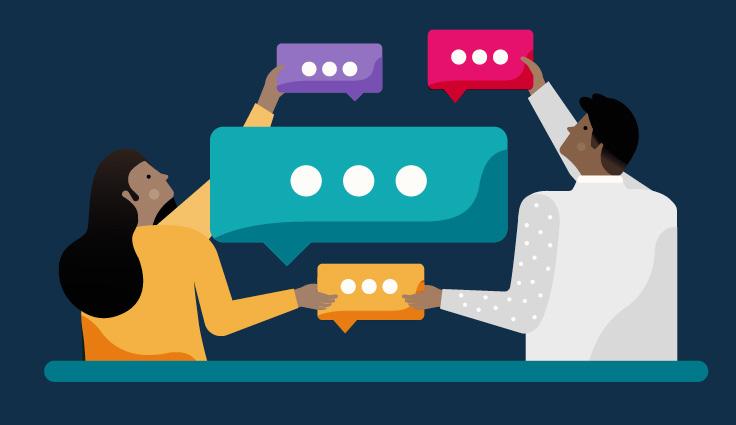
Adam Newey | Sub-Editor
Rav Sekhon | Expert Advisor
ART & DESIGN
Amy-Jean Burns | Head of Product & Marketing
Charlotte Reynell | Creative Lead
Rosan Magar | Illustrator
COMMUNICATIONS
Alice Greedus | PR Manager
Emily Whitton | Marketing Coordinator

CONTRIBUTORS
Deborah Ward Victoria Stokes, Elle Redman, Jenna Farmer, Fiona Fletcher Reid, Kate Orson, Hannah Rose Robson, Caroline Butterwick, Dr Anisha Patel, Lucy Donoughue, Lucy Jones
SPECIAL THANKS
Kacie Shoulders, Ali Harper, Gemma Holmes, Mel Riley, Jennifer Warwick, Helen Snape, Peter Heath, Keith Howitt
MANAGEMENT
Aimi Maunders | Director & Co-Founder
Emma Hursey | Director & Co-Founder
Paul Maunders | Director & Co-Founder
SUBSCRIPTIONS
MEL RILEY
MBACP
Mel is a senior accredited adult, child, and family therapist.
Join
Are you a wellbeing expert with valuable insight to share? Happiful professional membership includes opportunities to be featured in our award-winning magazine. Discover how to join by emailing us at professionals@happiful.com
For new orders and back orders, visit shop.happiful.com, or call Newsstand on +44 (0)1227 277 248 or email subenquiries@newsstand.co.uk
CONTACT
Happiful, c/o Memiah, Building B, Riverside Way, Camberley, Surrey, GU15 3YL Email us at hello@happiful.com
HAPPIFUL FAMILY
Helping you find the help you need. Counselling Directory, Life Coach Directory, Hypnotherapy Directory, Nutritionist Resource, Therapy Directory
If you are in crisis and are concerned for your own safety, call 999 or go to A&E
Call Samaritans on 116 123 or email them at jo@samaritans.org
SANEline
SANEline offers support and information from 4pm–10pm: 0300 304 7000
Mind
Mind offers advice Mon–Fri 9am–6pm, except bank holidays: 0300 123 3393. Or email: info@mind.org.uk
Switchboard
Switchboard is a line for LGBT+ support. Open from 10am–10pm: 0300 330 0630. You can email: chris@switchboard.lgbt
p38
FREE FINANCIAL ADVICE
For free advice on any financial topic, as well as money tool and calculators, head to moneyhelper.org.uk
p46
INFORMATION ON ANXIETY
Discover more about what it means to live with anxiety, common causes, and guidance at anxietyuk.org.uk
p73

For both practical and emotional advice and support following a cancer diagnosis, visit macmillan.org.uk

shop.happiful.com
Our two-for-one tree commitment is made of two parts. Firstly, we source all our paper from FSC® certified sources. The FSC® label guarantees that the trees harvested are replaced, or allowed to regenerate naturally. Secondly, we will ensure an additional tree is planted for each one used, by making a suitable donation to a forestry charity. Happiful is a brand of Memiah Limited. The opinions, views and values expressed in Happiful are those of the authors of that content and do not necessarily represent our opinions, views or values. Nothing in the magazine constitutes advice on which you should rely. It is provided for general information purposes only. We work hard to achieve the highest possible editorial standards, however if you would like to pass on your feedback or have a complaint about Happiful, please email us at feedback@happiful.com. We do not accept liability for products and/or services offered by third parties. Memiah Limited is a private company limited by shares and registered in England and Wales with company number 05489185 and VAT number GB 920805837. Our registered office address is Building 3, Riverside Way, Camberley, Surrey, GU15 3YL.
One undeniable truth is that finding the right help for each individual is a journey – what works for one of us will be different for someone else. But don't feel disheartened if you haven't found your path yet. Our Happiful family can help you on your way. Bringing together various arms of support, each of our sister sites focuses on a different method of nourishing your wellbeing – from counselling, to hypnotherapy, nutrition, coaching, and holistic therapy. Download our free Happiful app for more.

We live busy lives, and it’s easy to put our health and fitness on the back seat sometimes. But taking care of our health doesn’t have to become another chore, as awardwinning osteopath Anisha Joshi is proving with the launch of her #MoveFor1Minute campaign.
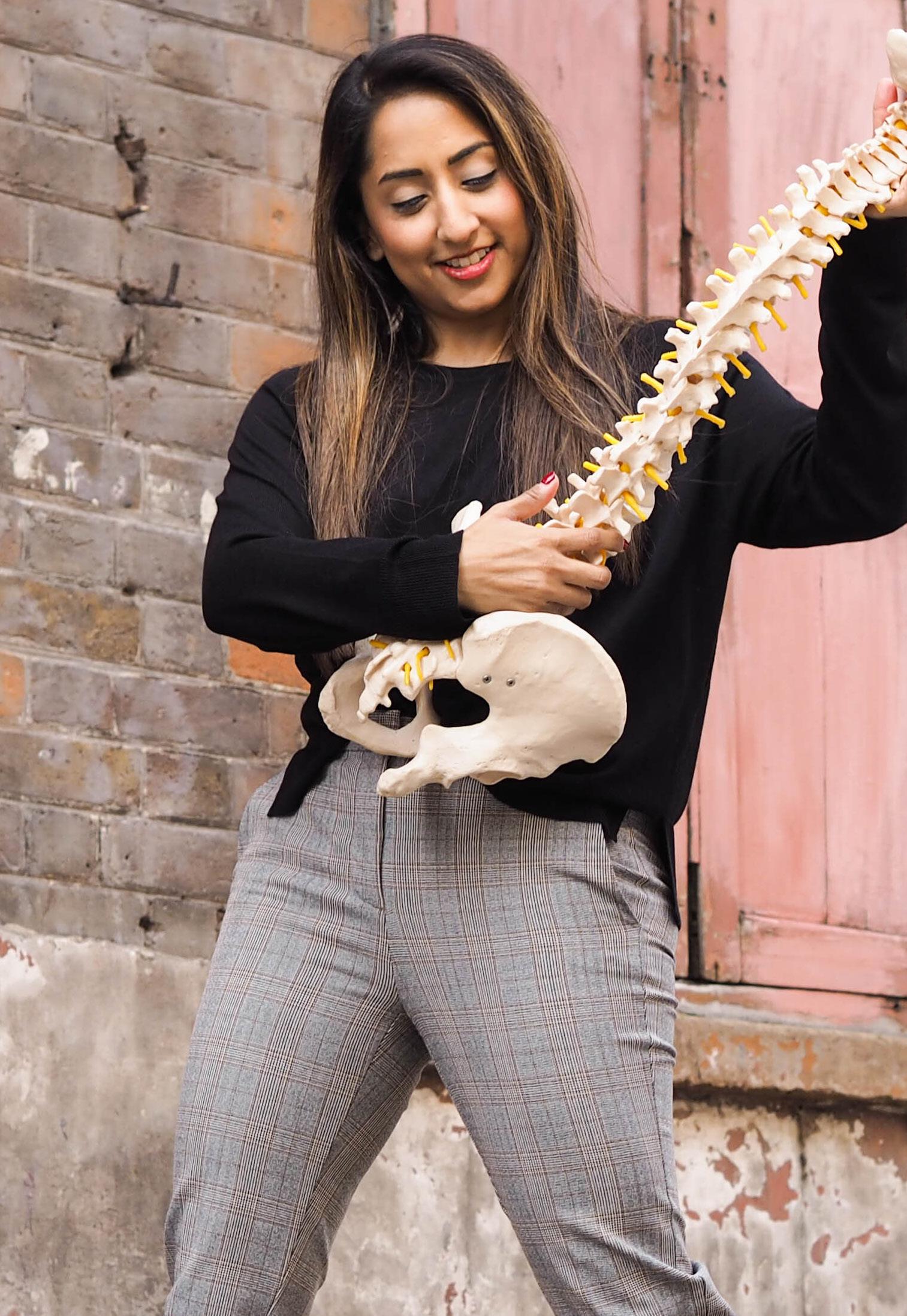
Focusing on encouraging people to take a break and move their bodies for just one minute every Sunday at 11am, the campaign was built on the understanding that it can be challenging to find the motivation to be physically active, but small, attainable goals can work for everyone.
By joining her Instagram live stream, Anisha’s hope is that others will be inspired to try movement based around stretching, balance, and strengthening to target the entire body. These simple yet effective movements can help to increase blood flow, reduce stiffness, and generally improve your mood – which can make such a huge
difference to our physical health and wellbeing, even if you’re doing it for just one minute.
Anisha’s followers have already seen the positive effects of this. One of them shared: “Anisha’s Sunday lives have made me realise how easy it is to fit in movement throughout my working day. Consequently, I
have noticed a marked reduction in my back and neck pain, which has enabled me to be more productive at work, and generally a nicer person to be around!”
So if you’re ready to get your move on and start your day more productively, make sure to follow her at @anishajoshi.
Writing | Lauren Bromley-Bird#MoveFor1Minute campaign is shaking up our healthPhotography | Kate Winney Anisha Joshi has clinics in London, Hitchin, Surrey, and Dubai – osteoanisha.com
HEALTHCARE
Feeling heard, supported, and cared for is all any of us want when seeking help from medical professionals, right? To help make this a reality, and ensure empathy takes its rightful place in healthcare, a new centre has been launched at the University of Leicester.
Stoneygate Centre for Empathic Healthcare was established in 2022, but officially launched in April this year. Pioneering a new approach to medical education and training with empathy at its core, the centre is the first of its kind in the UK.
As well as improving patient satisfaction, empathy is known to reduce pain experience, and even protect doctors from burnout. Despite this, levels of empathy in professionals have been found to take a tumble as medical training goes on.
In the year since its establishment, the centre has begun producing research on this lack of empathy, and possible solutions. One project, in particular, looked at the link between empathy and diversity.
Centre director, Professor Jeremy Howick, says: “Our research called for health professionals to embrace the benefits of diversity to exercise their ‘empathy muscle’. Leicester is the perfect place to study the positive elements of diversity, as it’s one of the most diverse cities in the UK.”
The centre will provide resources to help embed empathy in Leicester Medical School’s curriculum before expanding across the UK and beyond. We look forward to seeing the results, with empathy leading the way. Writing | Kat Nicholls
When we’re faced with huge human atrocities, such as the Ukrainian war, it’s hard not to feel a sense of helplessness. We can become overwhelmed by those feelings, and be left stunted. But, one 99-yearold woman from Lincolnshire is proving that small acts of kindness do have the ability to cut through the sorrow.
Hats for Ukrainian Babies is a charitable initiative organised by the Rotary Club, and aims to send knitted baby hats to displaced Ukrainians. And when Joan, a resident at Louth-based care home the Wolds Care Centre, heard about the appeal, she picked up her needles and got to work – singlehandedly stitching up an astounding 108 baby hats.
“The war in Ukraine is truly awful, and I wanted to help and show my support. I really enjoy knitting, so when I heard about the appeal I couldn’t wait to get involved,” Joan explains. “It’s been a challenge, but a very rewarding one, and I’m so pleased I’ve managed to make nearly 110 baby hats. It’s certainly kept me busy!”
Joan’s achievement is a perfect reminder of the many forms that support can take, and how, often, the main thing needed to make a difference is a willingness to try.
“It’s no mean feat to hit treble figures in knitted hats,” says Michaela McGlynn, the Wolds Care Centre manager. “She’s done an incredible job, and been extremely kind and resilient
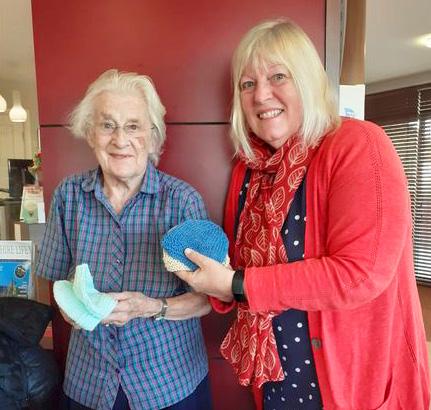
to knit as many as she has – a donation that will make a big difference to those in war-torn Ukraine.”
Writing | Kathryn Wheeler
What does it really take to build a new habit? You might have heard people suggest doing it for 21 days straight and, voilà, the habit is set! But, according to a new survey, it has less to do with a ‘magic number’, and more to do with intention and motivation. If it’s a habit you can easily and realistically shoehorn into your daily routine, such as handwashing, it’s quicker to pick up. But if it’s something that takes more effort, like going to the gym, you could be in for a longer ride.
The research, published in the journal PNAS, applied a machine learning technique to identify and compare habit formation of both gym attendance and hospital handwashing. What they saw was that getting into the habit of going to the gym is a long-term commitment, taking about six months to fully form. What’s more, not going too long between gym sessions gives the clearest forecast as to whether the habit sticks or not.
If you are still waiting for the good news, it’s coming. We can’t make ourselves do something a set number of times and expect miracles, but we can look at our motives. Asking yourself, ‘What am I gaining from this, and can I make it fit in with my everyday life?’ will make it easier to kick old habits, and form new ones.
Writing | Samantha Redgrave-Hogg
Put your puzzle prowess to the test with these brainteasers
Unscramble the word in each of the three circles to discover the centre letter that links them all.
Fill the grid so that each column, row, and 3x2 subgrid contains the digits 1–6.
‘Lovebombing’ is now recognised as a sign of abuse by the Crown Prosecution Service
It’s not what KFC officially stands for, but recent events suggest otherwise. A journalist who filmed a man proposing in South Africa, decided to mock the choice of venue (a branch of KFC) online, only to find an outpouring of kindness in response. Companies wanted to support making it a wedding to remember, including the Standard Bank of South Africa offering to clear their loans (of around $20K)!
Germany has shut down its last three nuclear power plants, in a move to support renewable energy
For the first time in 95 years, the Miss England contest will feature a ‘makeup-free’ round
The lapping of waves, salt in the air, and ducking to avoid a seagull after your chips –who doesn’t love a day at the beach? Well, we have a great recommendation, as Bournemouth Beach has been named the ‘most accessible’ in the UK in a study by Oak Tree Mobility. Taking into account factors such as its Disability Rights Survey Score, disabled toilet access, and the cost of hiring wheelchairs, the sandy stretch in Dorset came out top, although Tripadvisor notes how busy it gets at peak times. Rounding out the top three is Sandbanks Beach, in Poole, and Porthminster Beach, in St Ives. So, for a grand day out, head to the beach. It’s a ‘shore’ thing.
When the Royal British Legion put out an appeal for birthday cards to celebrate World War Two veteran Ernest Horsfall’s 105th birthday, it never expected such a kind response from strangers. Ernest, who has no surviving relatives, was ‘surprised and amazed’ to receive more than 3,000 cards from well-wishers to his care home in Preston, Lancashire, including one from Prime Minister Rishi Sunak. And, to make the day even more special, Ernest’s girlfriend, Margaret, flew in from Iceland to celebrate!
An alternative wellness walk is on offer in Wales, and is gathering global attention! ‘Good Day Out’ offers animal therapy in the form of quality time with pigs, and you can even help with a piggy spa session.
It’s often called the most important meal of the day, yet many of us appear to be half asleep when making breakfast. A new survey on ‘very British and relatable breakfast fails’ has been released, with burnt toast topping the chart (48%), but not far behind come ‘overcooked dippy eggs’ (34%), and ‘cremated bacon’ (23%).
A groundbreaking new drug to treat endometriosis is being trialled, and could offer a promising alternative to countless women living with the condition. With no new advancements in the area for around 40 years, research and developments have been long overdue. But, the good news is that if it’s successful, dichloroacetate will be the first non-hormonal or surgical treatment on offer, looking to directly target the debilitating pain associated with endometriosis. With 1.5 million women in the UK affected, hope is on the horizon for improved options, and quality of life, for all affected.
A hydrogenpowered hypersonic plane is being developed, which will travel at five times the speed of sound
Signing off a text to your boss with a kiss, or accidentally ‘liking’ an ex’s Instagram post – if the thought of these mishaps has you coming out in a cold sweat, you’re not alone. A survey by HMD Global recently investigated Brits’ biggest ‘phone pas’ and these cringeworthy responses that made the top 10 are all too relatable. The most infuriating incident turned out to be dropping your phone and smashing the screen, followed by playing a video at full volume in public, and starting a long journey with only 3% battery. #Facepalm
BBC Radio 1 DJ Adele Roberts might be used to playing records on the airwaves, but she recently started breaking records instead! Having used a stoma bag since surgery for bowel cancer in 2021, Adele went on to race in the London Marathon 2023, completing it in an incredible 3:30:22 to become the new Guinness World Record holder for the ‘fastest marathon with an ileostomy’.
Not every family has one, but we’ve all heard of the ‘problem child’ trope. Whether it’s a sibling, distant aunt or uncle, or maybe even you, the family scapegoat is the one who ends up getting shamed, blamed, or criticised for just about everything that goes wrong. But why does this happen? And how can we stop being blamed when things aren’t our fault?
Scapegoating is the act of blaming someone – or a group of people – for something that has happened, even if they aren’t actually responsible. Typically starting during childhood, scapegoating is a sign of unhealthy family dynamics, which might be done to protect the overall image or reputation of a family, or as the default to always favour one or more family members (commonly referred to as the ‘golden child’, who is seen as able to do no wrong) by
placing blame on one person (the ‘scapegoat’).
Family members may choose a scapegoat based on arbitrary factors that the individual cannot influence, such as picking an oldest/youngest child, basing their preferences on gender, appearance, intelligence, skin colour, or even sexual orientation – or the reason may not be apparent at all. Those who are unfairly targeting you may be projecting their own feelings of shame, rage, and blame onto you, instead of dealing with uncomfortable thoughts, feelings, or behaviours. By finding someone to blame, they avoid taking responsibility.
Signs that you have become your family’s scapegoat include:
• Being treated differently from your siblings, or other family members of a similar age.
• Being expected to take on additional responsibilities others aren’t, that might typically be expected of a parent, guardian, or carer.
• Sensing a lack of interest in your passions and hobbies.
• A lack of connection, or distance between you and family members.
• Any mistakes by you seem to be blown out of proportion.
• Your successes are downplayed or glossed over.
• Feeling like the butt of all the jokes, or teased incessantly for your attributes.
• Not having anyone stand up for you or intervening when you’re being picked on.
Finding yourself the family scapegoat can lead you to unconsciously or consciously take on different roles as a way to try to cope with the situations or behaviours. This could mean that
Nobody likes to be blamed for something they didn’t do. So, why do some of us end up pulling the short straw and taking the heat for others’ mistakes or wrongdoings?
you feel pressured or expected to provide emotional or physical care for family members, to take over during a crisis, or to complete an unreasonable number of tasks. You may also strive for perfection (to avoid criticism or gain approval), or feel the need to rebel against authority (even to the point of self-sabotage).
Over time, being treated as a scapegoat can have a negative effect on you, your relationships, and what you see as ‘normal’ behaviour. It can lead to experiencing more toxic relationships due to struggling to recognise gaslighting or unhealthy behaviours. Additionally, you may have trouble maintaining boundaries, continue to accept blame for things that aren’t your fault, and view yourself in a more negative light as being told you are ‘bad’ or ‘at fault’ repeatedly can make you doubt your worth and abilities. This can result in always seeing others’ needs as more important or valid, sacrificing your own in the process. Being treated as your family’s scapegoat can become a type of trauma. Having others overlook the good things that you do, while highlighting every mistake and placing blame for things outside of your control, can leave a lasting impact.

The reasons why someone may be scapegoated can vary. For example, a parent may unintentionally or intentionally change their behaviour towards their child if they remind them of an ex-partner, or may treat siblings, half-siblings, stepsiblings, and/or adopted children differently from one another. >>>
Being told you are ‘bad’ or ‘at fault’ repeatedly can make you doubt your worth and abilities
Often, parents who were raised in dysfunctional families, as either the golden child or scapegoat, may continue the cycle with their own kids. It’s also possible that they may have a personality disorder, including narcissistic personality disorder or borderline personality disorder. This can lead to blackand-white thinking, as well as idealising or devaluing others. Scapegoating often starts during childhood, leading to children thinking that they are the issue, as they don’t have the experience to recognise that something is wrong or unhealthy in their family dynamic. But, it’s important to remember that you, as the person being scapegoated, are not the problem.
Just knowing and understanding what a scapegoat is can help you to watch out for the signs. From there, the following four steps can be helpful...
Learn how to set and maintain healthy boundaries. You may find that your family ignores or pushes your boundaries, either to try to retain control, or out of habit, but stand firm. Boundaries are a way of telling people how, when, and what behaviour you are willing to accept. If you allow others to push or break your boundaries, you are unwittingly telling them that your own comfort isn’t important. Healthy boundaries are a form of self-care that helps us to clearly lay out how we feel; they help us to assert ourselves honestly, and openly.
Refuse to interact. Sometimes, the best way to protect yourself from being scapegoated can be to remove yourself from the situation, but this isn’t always easy or possible. If so, doing your best to not get involved can be another option. This could mean refusing to take on additional responsibilities, saying no, or not interacting during situations where it’s likely you will be targeted.
Reduce or restrict contact. This can help you to avoid the constant barrage of negativity and blame, and can involve both decreasing how often you speak with or see them, as well as reducing how much you tell them about what’s going on in your life.
The ‘grey rock’ method. Often used when dealing with narcissists or toxic relationships, ‘grey rocking’ involves acting
as unresponsively as you can as a way to divert toxic people’s behaviour away from you. This could mean giving short or oneword answers so they have less chance to turn things back on you, or showing little emotional reaction if they belittle you. Giving non-committal responses, and avoiding eye contact can also be helpful.

Try to create a support network, which can help you gain a more healthy outlook. According to research, emotions are actually contagious – meaning that when we are surrounded by positive attitudes, we can feel a boost of positivity and increased energy. Unfortunately, this also means that when we are surrounded by negativity, we feel more drained and down.
Working with a qualified therapist or counsellor can give you a safe space to talk openly about your past, present, and what kind of future you want to work towards. They aren’t there to offer judgement, take sides, or criticise you, and, instead, can help you to better understand healthy boundaries, toxic behaviours, and positive family dynamics, as well as to find new, helpful coping strategies you can use throughout your life.
There’s a world of opportunities out there, and for many people, the idea of travelling to far-flung places fills them with joy and excitement. Experiencing new things can help us expand our perspectives, as well as help us to break free of monotonous thought patterns. But that doesn’t mean that travel is without its bumps in the road. If you’re an introvert, travelling may be something that presents specific challenges, and the idea of those challenges could be enough to dampen your dreams.
But it doesn’t have to be that way. With the help of confidence coach Gemma Holmes, we’re exploring five ways that you can make travelling as an introvert a breeze.
“Contrary to popular belief, being an introvert isn’t about being shy or about disliking people,” Gemma explains. “It’s about what
leaves a person feeling drained, and where they find their energy topped up most easily.
“Extroverts tend to draw their energy from the people around them, whereas introverts may find long periods of interacting with others draining, and will value some time by themselves to replenish their energy reserves. As with many things in life, introversion to extroversion is a spectrum, and you may find where you sit on the spectrum changes over your lifetime.”
Do these traits line up with what you see in yourself? As Gemma explains, there aren’t any hard and fast rules when it comes to categorising someone as either an ‘introvert’ or ‘extrovert’, and you may see that you have traits that could fall on either side – you may even find that your reaction to social situations is different depending on what’s happening around you. That said, these personality groups are still a helpful foundation for understanding ourselves, so it’s worth spending some time
learning about yourself, and how different scenarios affect you. This is your springboard to making plans that suit you.
“Being an introvert doesn’t necessarily mean you’re happiest in the mountains with no other humans for 50 miles (though it might!),” Gemma says. “Some introverts love the hustle and bustle of busy cities, as long as they don’t have to interact directly with too many others. People-watching can be a great source of joy for introverts.”
Gemma recommends exploring what brings you joy, and what sucks your energy, and then making plans around these features. She suggests casting your mind back to trips you’ve been on in the past. What was it about these trips that worked for you? And what about them didn’t work? Are there any patterns that you can pick up on and apply to your destination hunt? You may also want to consider the role your accommodation plays in all this. >>>

It’s not selfish to ensure your needs are met on your travels
“If you really enjoy conversing with people, but only when it’s a smaller group, consider more intimate excursions and smaller group accommodation options, such as agritourism or homestays,” Gemma suggests. “These can offer the chance to still connect with locals or other tourists and have stimulating conversations, without needing to network with a large group.”
Taking some time beforehand to create an itinerary can make navigating travel as an introvert a whole lot easier, and gives you the opportunity to tune into, and respect, your needs.
“If you’re travelling solo, you can build a bespoke itinerary that really hits the spot,” says Gemma. “If you know that an element of your trip will require a lot of social interaction, plan in pockets of time for rest and quality time by yourself afterwards. Journaling and looking back over photography can be a great way to reflect and decompress after a busy day, without needing to spend the evening talking it over with others. Travels are the perfect time to start a gratitude diary, which will do wonders for your wellbeing when you continue the habit back home.”
Gemma also highlights that you don’t have to do certain activities, just because everyone else is doing them. Very busy tourist traps might be one person’s cup of tea but, for you, they may be overwhelming and stressful. So, skip out on the things you’d rather not do, and make more time for those you do.

“If you’re travelling with others who get energy from different types of activities, don’t be afraid to share what you need from the experience, so you don’t end up coming home more drained than when you left,” Gemma says. “People are so familiar with what brings them joy that it can be hard to comprehend that it isn’t the same for others. Open communication is key in the planning stage! And, remember, itineraries shouldn’t have to be set in stone. If something feels uncomfortable or overwhelming, it’s OK to change your mind.”
Gemma also suggests dividing up tasks depending on what your strengths are. While you may not enjoy asking for directions, you may be great at planning, or at finding hidden gems. And your friend may have no problem asking for help when it’s needed, but would prefer not to spend time hunting for things to do. So, play to your strengths if you’re travelling in a group.
If you’re looking for some space and alone time on a holiday, but someone you’re travelling with has different ideas, putting up some boundaries and advocating for what you need can be difficult. From there, you might find yourself falling into peoplepleasing behaviours.
“Holiday time is precious, and if you get swept up in other people’s idea of a great trip, rather than
listening to your needs and desires, you can lose everything there was to gain from a break,” Gemma says. “There are some simple cues you can give that indicate you want to be kept in peace, such as headphones or a book in hand. But it’s also OK to be direct and share with people that you’re using the current time for some self-reflection and quiet, so while you really appreciate their offer of connection, you’re going to choose to do something different.”
Sticking to your boundaries can feel uncomfortable if it’s not something that you do often, but it’s worth doing in order to get the most out of your time away.
“It’s not selfish to ensure your needs are met on your travels,” Gemma adds. “While waiting until your annual holiday to focus on your wellbeing isn’t a sustainable plan, for many busy people their travels are especially precious windows of time and you should feel able to fill it with things that boost your sense of wellbeing, rather than deplete it.”
Remember, making sure your needs are met is an important part of self-care. And, in this case, a key pillar in making memories you’ll treasure for a lifetime.
For a moment in time, I was actually getting a little hopeful about the reduction in body-shaming comments. It seemed like people had begun to understand ‘your body, your business’, and actually stopped comparing women in those awful ‘who wore it better’ segments. Those dreaded features like ‘circle of shame’, where women had their cellulite highlighted on the front pages of magazines, seemed to become a thing of the past, but, recently, it feels as though there has been a downward slide. Things appear to be going in a direction that makes me feel like all the progress that has been made in the name of body positivity is coming undone, whether it’s speculation and comments about Madonna’s plastic surgery, or Halle Berry being shamed for posing nude in her 50s.
You should never comment on anyone’s body. Ever. There are no exceptions. I would even argue that when you ‘compliment’ someone,
you are in risky territory, however well-intentioned your words might feel. I remember I once had a friend who would ‘compliment’ me every time she saw me by saying “You’ve lost weight.” I had never lost weight, and it always made me feel awkward, because weight loss is very much associated with the periods in my life when I was hospitalised and bedridden.
A lot of these comments are under the guise of concern for someone’s health, but the reality is that another person’s health is none of your business and, most importantly, you can’t tell someone’s health from their appearance.
A key example of this can be when people lose weight because of illness, while some gain weight due to the medication they take. When I gave a talk for the Teenage Cancer Trust to an audience of 15 to 17-year-old children, the main concern that arose during the question and answer segment was that these children didn’t want to
take their medication because it is well known that steroids can make people gain weight. If that doesn’t demonstrate that people’s concern around weight is not about health, then I don’t know what will. All of this shame that comes from commenting or criticising another person’s physicality can cause the individual on the receiving end to become isolated, as they withdraw from society for fear of this judgment and ridicule. And here is the great irony: loneliness is believed to be a greater killer than obesity, with a study by Brigham Young University, in Utah, finding that social isolation can increase the chances of premature death by 50%. So, commenting on someone’s appearance, under the excuse of concern for their health, and the resulting shame, can lead them to pull away from society, and deepen the impact of isolation – to the detriment of their health. With all this in mind, it’s so important to be aware that
As the very unwelcome narrative of critiquing and commenting on others’ bodies seems to be growing in momentum again, columnist Michelle Elman lays bare the myriad of reasons why this conversation needs to be shut down, immediatelyWriting | Michelle Elman
someone’s weight loss that you’re ‘complimenting’ could have occurred as a result of grief, depression, or illness. Likewise, you could be shaming someone for weight gain that may be due to pregnancy, medication, or eating disorder recovery.


Even if the change in appearance is a result of not taking care of their health, shaming them is not going to improve that health. And, I’m going to say something controversial, if they don’t want to take care of their health, it’s
on them. They are allowed to deprioritise their health. They will either be content with health sitting lower in their values than, for example, family, friends, a social life, or even work, or they will learn from it and the consequences that might occur. But it is their choice.
At the end of the day, it doesn’t matter why someone’s body is changing; their body is none of your business, and just because you notice a change in someone’s physicality doesn’t mean you have
to comment on it. They will be more conscious and aware of the change than you, and you don’t need to notify them of it. Ultimately, keeping your opinions about someone’s appearance to yourself is a good boundary. Your opinion isn’t being asked, and therefore to offer it assumes you know better about the person than they do.
Ariana Grande said it best when she defended her own body earlier this year: “You don’t know what someone is going through.”
Stop assuming you know someone’s life by what they look like, and stop assuming everyone wants to look the same. How you look is the least important thing about you. We must be able to find a more interesting topic than someone’s body.
Another person’s health is none of your business and, most importantly, you can’t tell someone’s health from their appearanceMichelle Elman is an author, TEDx speaker, and five-board accredited life coach. Follow her on Instagram @michellelelman
Whether it’s the ‘terrible twos’ or life with a ‘threenager’, dealing with outbursts of anger and frustration from little ones can be really tough. Jenna Farmer chats to an expert to discover how you can tackle tantrums head on, and support your child in expressing their emotions
Illustrating | Rosan MagarBeing a parent can be difficult at times, especially when trying to convince a young child to listen to you. If you’re a parent to a toddler or preschooler, you’re probably already more than familiar with tantrums. These outbursts, which can include shouting, crying, hitting, or throwing items, are extremely common in young children, and tend to begin at around 18 months, according to the NHS.
Tantrums usually develop because a child struggles to communicate their emotions, not only because they don’t have the language yet, but because figuring out their feelings can be tricky.
“Their developing brain simply doesn’t have the capacity to inhibit these responses, and gets overwhelmed a lot more easily than ours,” says child, adolescent, and adult counsellor Ali Harper.
If you find yourself in tantrum territory, here are some simple things you can do to deal with it with confidence.
1. Take your own emotions out of it. You’re likely fed up, sleep deprived, and frustrated – but bringing your emotions into the mix isn’t very helpful in this situation.
“It can be easy to jump in with a response that comes from a place
of annoyance or exasperation, but this means you suddenly have two very emotional people in the room rather than one,” says Ali. Instead, focus on keeping calm and showing your toddler alternative ways to express their emotions.
2. Teach your child that it’s OK to be angry. Feeling all sorts of emotions is completely normal and healthy, so we don’t want children to think it’s wrong to express theirs. How often have you been told to try the naughty step, or to take their toys away when your toddler starts screaming and throwing? The
problem with these strategies is that we’re teaching children that showing emotion is wrong, and not actually helping them process it.
the bath with your clothes on), and around how they express their angry feelings (I won’t let you hurt yourself or other people).”
“Our own experiences of being parented, or the messages we’ve received from those around us, may also include seeing tantrums as manipulative, and then responding by removing affection, or physically isolating children. These responses not only give children the message that their feelings are not acceptable, but also leaves them without their main source for learning how to regulate themselves – you!” Ali explains.
“Try to get alongside them, and empathise with how overwhelmed they are feeling. Offer a hug or sit next to them – it’s important for children to get the message that their feelings are safe.”
Understanding your child’s emotions isn’t the same as giving them everything they want. If you’ve said no sweets before dinner, then stick to the message, however tempting it is to relent.
“Boundaries help children to feel safe,” Ali says. “Once you have said no to something, try to stick to it, both in terms of behaviour (no, you can’t climb the bookshelf/get in
4. Move on quickly. Sometimes we tackle tantrums like a pro, and other times we just seem to make it worse. However it’s gone, try to move on quickly once the tantrum is over, and don’t keep bringing it up, as most young children live very much in the ‘here and now’. That goes for dwelling on it once they’re tucked up in bed, too.
“Go easy on yourself if you don’t always deal with them exactly how you would have liked to,” says Ali.
5. Play detective. It’s common for small children to have tantrums every day, and while these might seem to come from nowhere, you may be able to pinpoint things that trigger them. Common tantrum triggers include tiredness and hunger, or frustration, such as over having to share a toy or not wanting to leave the park.
While we can’t eliminate these triggers, it can help us plan accordingly. In younger children, this might require sticking to a proper nap schedule, while older children may benefit from things like countdown timers and visual reminders when transitioning to new places or things. Having healthy snacks readily available is always a good idea, too!
Tantrums are extremely common but, for most children, they do get better as they get
more experience in handling their emotions. By being calm, helping your child understand their emotions, and providing firm boundaries, you can tackle tantrums quickly and effectively.
Jenna Farmer is a freelance journalist who talks about life as a mum with a speech-delayed child on her blog mumernity.co.uk and on Instagram

Understanding your child’s emotions isn’t the same as giving them everything they want
Four people who fight for justice share how they deal with compassion fatigue, exploring the value of rest and resistance in an era of 24-hour news
Writing | Elle RedmanBinding us together and stirring us to action in times of unrest, compassion is not only vital to human connection, but also acts as a key motivator when it comes to making the world a better place.
While our minds, however, are flooded with an endless stream of world news, is it possible we’re becoming increasingly desensitised to the issues hitting the headlines?
Over the past few years, in fact, there’s been no shortage of causes to care for. And as cycles of global injustice continue, it’s only inevitable that we’ll be left wondering whether the world requires more compassion than we can muster up and offer.
According to psychiatrist, educator and co-founder of the International Society for Traumatic Stress Studies, Dr Frank Ochberg, there’s a name to describe this feeling of weariness.
“With a similar set of symptoms to secondary traumatic stress disorder (STSD), compassion fatigue is when helping begins to hurt – a pattern of tiredness and emotional depletion from too much caring and too little selfcaring,” he explains.
Dr Ochberg is the editor of the first text on the treatment of post-traumatic stress disorder (PTSD), and has been a pioneer and leading authority in trauma science since the 1960s. He believes that, over time, our ability to feel and care for others can become eroded through overuse of our skills of compassion.
On top of fatigue, he says, you might also experience a level of grief. However, this doesn’t mean that you’re not a kind or deeply committed person. “Unfortunately,” Dr Ochberg adds, “you’ve just run out of energy.”
Common among healthcare professionals on the frontlines,
such as nurses, doctors, and aid workers, compassion fatigue can also be experienced by those providing various forms of empathetic support.
After emerging as a concept in healthcare, compassion fatigue slowly began to appear in the field of media, referring to the idea that overexposure to negative news reports and unsettling images could cause the public to reject rather than respond to information.
Put simply, sometimes, the cost of caring can be high. So, how can we combat compassion fatigue?
“We need to help one another stay active and hopeful,” says Dr Ochberg.
I know I can’t help everyone, but I can help someone
And one of the greatest defences against compassion fatigue, he shares, is joy.
“Laughter is infectious,” he says, “And the minute you laugh with someone, you fight compassion fatigue and burnout.”
Dr Ochberg also emphasises the value of rest, healthy sleep habits, kindness, and a sense of gratitude for the gift of life.
Here, drawing on their own personal experiences, four people who fight for justice explain how they combat compassion fatigue and remain grounded, resilient, and hopeful in the face of injustice.
This panel of change-makers includes Charlie Blythe, European regional director of anti-human trafficking organisation, A21; Jo Becker, climate justice activist and co-host of ‘The Yikes Podcast’; Ruth MacGilp, sustainable fashion campaigner and Jess Mally, antiracism and social change educator.

Have you ever experienced compassion fatigue and, if so, how did you overcome it?
Ruth MacGilp: Absolutely. During particularly stressful periods at work or in the wider world, I often begin to feel apathy towards fighting for better. But I get the drive back when I connect with others who feel safe enough to share similar feelings, and realise that while the motivation ebbs and
>>>

flows, this is a long-term journey, and it’s OK not to feel 100% all the time.
Jess Mally: Almost every day. Something to be mindful of, however, is the privilege many of us have as a result of socioeconomic background and where we live in the world. For example, for a single mother fleeing a war-torn country with three children, giving up is not an option. By saying, ‘This is too much,’ or ‘I don’t want to deal with this,’ when watching the news, we are exercising a level of privilege. Suffering can’t be compared, and this doesn’t mean we should burn ourselves out or become overwhelmed. Rather, we should think of rest as a positive responsibility. It’s not only for us. Instead, it’s a tool to help us keep going.



Compassion is key when it comes to making the world a fairer place. However, it’s easy to feel overwhelmed by the weight of world issues.
Why do you think it’s important to pursue rest, even in the face of injustice?
Jo Becker: Practising rest can be a catalysing force for change. We often think that by burning ourselves out, world issues will be solved. Though when we look at the long history of the fight for liberation, change isn’t something that happens overnight. A lot of people find it hard to rest, because a delay in action will not stop suffering or oppression. There’s a lot on our shoulders, so we do need more people actively pursuing change. Unrest, however, creates tension.
necessary time to rest and reflect. Jess Mally: When we rest, we can be our fullest and most authentic selves, thus contributing to the better future we’re hoping to create. It’s the slowing down that reminds us of who we are, what we’re part of, and how we’re all connected. Practically speaking, as an advocate, I need to keep myself healthy in order to make a difference in the world. If I burn out, I can’t keep doing what I’m doing. Rest and reflection are important to model.
What motivates you to keep fighting for the causes you care most about?
Charlie Blythe: I bring it back to the one. You see, it’s individuals that make up the huge statistics we hear and read about in the news. Real people and real human beings just like you and me. Behind those statistics is someone’s mother, father, sister, brother, son, or daughter. I have the capacity to help, and even
Ruth MacGilp: Rest can be revolutionary in a society that values productivity, and efficiency above all else. But rest and self-care are easier said than done, as for me personally, ambition to do ‘more’ has always been an important part of who I am and my values. It’s a difficult balance to strike between burning out, and taking the
if that’s just one person, then that’s significant. That’s making a difference. I know I can’t help everyone, but I can help someone, and that’s what keeps me motivated, knowing that the part I play could change someone’s life.
How can we find a healthy balance of making a positive change without burning out?

Jess Mally: I think it’s worth noting that there’s a difference between being informed and merely consuming. We can be educated and informed about an issue without consuming every news notification and update. To find a healthy balance, I’d say practise media literacy, and take time to read a variety of trusted news outlets to understand what’s really happening in the world. Explore subject matters on a deeper level than headline by headline.
Charlie Blythe: We’re constantly seeing injustice and heartache on our screens and in the news. So,
it can be easy to think that nothing good exists, but the reality is, there are good things happening, too. There is much to celebrate and there are beautiful things to find happiness in. If you only ever focus on the pain of injustice, then you’re going to inevitably end up feeling overwhelmed and defeated. Those who make the biggest difference in
the world are those who are filled with hope and empowerment. While it’s important to know about the issues and events happening around the world, it’s just as important to actively seek out the good news – the wins, the progress, and the beauty. Happiness and hope fuel us into action.

“Dare to live the life you have dreamed for yourself
RALPH WALDO EMERSON
You’ll undoubtedly know the feeling, where it’s just one of those days when every single thing seems to go wrong and you can’t catch a break. But, as easy as it is to let that frustration and resentment fester, we’re sharing four transformative ways to stop a bad today from ruining tomorrow…
When bad news and mistakes might seem like a chain of dominos falling, their impact can feel magnified. But, as simple as it sounds, put it down on paper. All those grievances and errors, the frustrations and stressful incidents – list them off as plainly and factually as you can. Try to take the guilt, shame, or anger out of your reflections, then review the list. How many things would normally get to you? How many were unavoidable? How many are understandable? How many will you be bothered about, or even remember, a week from
now? Perhaps it’s not as bad as you first thought.
To stop yourself from wallowing in all the tough moments or times things went against you, try to counter it by remembering what went right. Our brains are programmed to focus on the negatives as a means of protecting us from danger, so we have to work all the harder to see the good that’s right in front of us. Whether you want to just think it through, note it on your phone, or write in a notebook, consider the things you did well,
what went in your favour, and all the things you have to be grateful for. Really appreciating those moments, people, or things, can help to bring you out of a funk.
If you’re on edge, the adrenaline is pumping, and anger seems to be coursing through your veins, you might just need time to process, let it all out, and release all your thoughts and frustrations into the world. Venting to someone you trust, and who has emotionally consented, can be a great way to let off steam. Having someone just to listen, or back you up and validate how you’re feeling can be immensely reassuring.
A good laugh could really be the best medicine. Releasing endorphins to help boost your mood, fight stress, and even reduce pain, laughter can feel like pushing a big reset button, reminding you that it’s not all bad. Whether it’s chatting to a friend, watching a movie, finding a live local show, or streaming a stand-up comedy, find something to make you laugh and you’ll be surprised at how quickly the memory of a bad day melts away.
Whatever method resonates with you, look to address the bad day, but close the chapter on it sooner rather than later. Turning the page will be the start of a new day, with untold possibilities and a fresh start.

Acommon thread when we think about a ‘legacy’ is leaving the world a little better than we found it. But, the task can feel daunting if you don’t know where to begin, or how we, as individuals, can actively, and regularly, make a difference. Well, the simple act of litter picking has the ability to reach new environmental heights when you either get involved with group events, like the Marine Conservation Society’s Great British Beach Clean, or organise your own. And, you can literally see the difference you’re making when you scour the shoreline, and spot a clear coastal path ahead.
With an estimated 270 million coastal trips made each year in the UK, and the summer fast approaching, our seaside locations will soon be buzzing with excited day-trippers and holiday-makers, eager to feel the sand between their toes and take a deep inhale of that revitalising sea air.
But, long after the splashes and children’s joyful laughter are no more than an echo on
the breeze, the remnants of a fun day out remain, from that long-forgotten drinks bottle half buried in sand, to a plastic wrapper that was swept down the beach, and cigarette butts dropped like confetti. Suddenly that picture-perfect day at the seaside becomes a nightmare for marine life, our environment, and the locals.
Despite progress being made in terms of sustainability, and businesses being urged to move to biodegradable materials, Keep Britain Tidy reports that 400 million tonnes of plastic is still being produced each year, with an astounding 40% of that being single-use plastic – which takes more than 400 years to decompose. It even goes so far as to say that “plastic will soon outweigh all the fish in the sea”, with the International Union for Conservation of Nature (IUCN) noting that 14 million tonnes of that plastic ends up in our oceans.
It paints a pretty bleak picture, but the tide does appear to be changing. Each year the Marine Conservation Society organises the Great British Beach Clean in an effort to inspire the nation to
make a positive impact on our coastline instead. The week-long event asks volunteers to head to beaches to litter pick, and record the rubbish they’ve collected, providing data that can help the society campaign for real change.
In fact, the information gathered has helped it lobby for several huge changemakers in the fight against plastic pollution, including the introduction of the plastic bag charge in supermarkets, and banning microplastics in personal care products.
As a result, it’s reported a 55% reduction in plastic bags on UK beaches since the 5p charge began (now 10p), and, overall, the 2021 Great British Beach Clean found an average of 385 items of rubbish per 100 metres, down 9% from 2020 – and a colossal 31% drop since 2019!
While this progress is a positive step, it’s essential that we maintain momentum – for the sake of all coastal and marine life plagued by our plastic waste. And the good news is that it’s so simple for you to take part.
This year, the annual Great British Beach Clean will take place between Friday 15 and Sunday 24 September 2023.
This week-long conservation drive is so beneficial thanks to not just removing rubbish, but gathering vital data to support wider-reaching campaigns as well. In 2021, it saw more than 6,000 volunteers clearing 55,000 metres of UK beaches, and collecting over 5,000kg of litter – and we can only hope to see more people get stuck in this September. With organised events you can sign up to, and resources to help if you’d like to lead your own beach clean event, the mcsuk.org is a fantastic hub of information to help you get involved this year.
million tonnes
2. Volunteer with an organised group
You don’t have to wait for a specific date to carve out time for conservation work. There are plenty of organisations arranging beach cleans across the country, all you have to do is search for one that suits you! Try keepbritaintidy.org, nationaltrust. org.uk, or beachclean.org as a starting point.
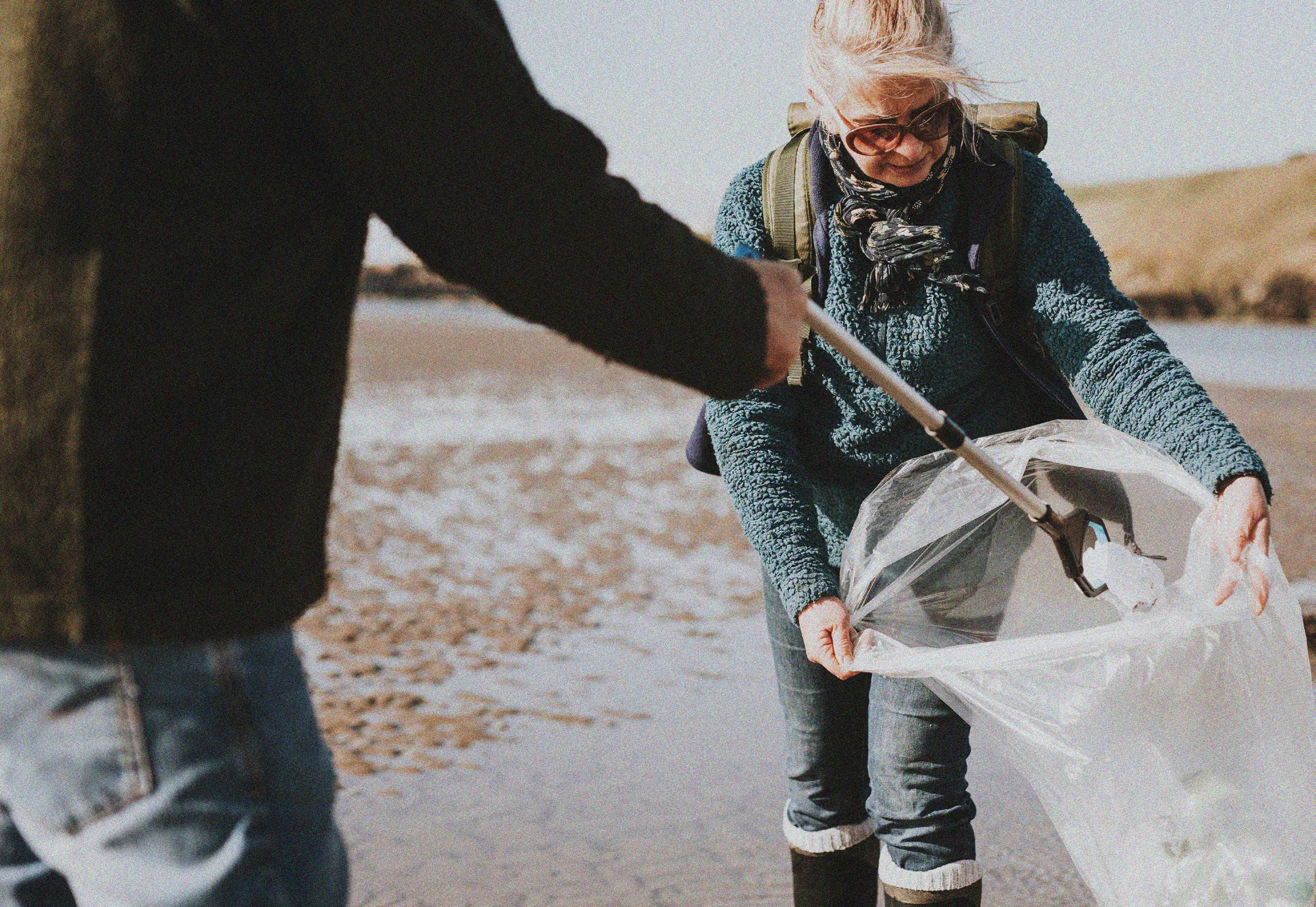
You can still make waves in environmental protection, without joining a big group. Go solo, or with a few friends, and collect trash on your travels, disposing of it safely and properly, knowing that you’re restoring these beautiful locations with the respect they deserve.
You take a deep inhale as you let your body adjust to the temperature. With each breath, you start to relax, that tightness in your chest easing. And, as you notice your surroundings — the ripples and the sounds of those around you — a sense of calm washes over you, a comforting warmth, despite the cold water you’re standing in.
“The first word that comes to mind is invigorating,” says Josh, when I ask how it feels to take part in a cold water swim. “There’s no getting away from the fact that, at the start of every swim or dip, it’s pretty damn cold, and it will try its best to take your breath away. But since joining the group, I’ve learned to control my breathing, which takes away part of the initial shock.”
IceBreakers is more than a cold water swimming group, it’s a community of men supporting men. Officially named in 2020, the group was born from a desire to provide a space and ritual for any man who might be struggling with their mental health. With chapters in Bath and Brighton,
IceBreakers hold scheduled dips every week, as well as extended sessions on Sundays for newcomers, full moon dips, weekend retreats, and even a book club.
“‘IceBreakers’ because it’s a cold water experience and because we welcome open and honest conversations, creating breakthroughs and impact for our community of men.”
- Tim BowlesIceBreakers describes itself as “not therapy, but kind of”, offering men a place, outside of the usual pub environment, to gather that feels adventurous, but more human and healthy.
“The benefits of being part of a community that dips in cold water are endless – the sense of camaraderie, along with the mental and physical impact of the cold water practice, is enormous,” explains founder Tim Bowles.
“The camaraderie is so powerful – as people in today’s world, we often lack the space that our tribal ancestors would have created. To sit around fires or simply hang out in nature together – it somehow feels like we are recreating this connection.”
Cold water swimming (also known as winter or ice swimming) is the act of swimming outdoors, mainly during the winter months or in the colder regions. The practice has a long tradition in northern countries, but has only made its way to the UK in recent years. For those in good health, cold water swimming appears to have many benefits. However, as with any new venture or activity, it is important that those taking part do so safely and under appropriate guidance, in order to reap the rewards. But, as a 2020 report in the International Journal of Environmental Research and Public Health notes, these are plentiful, finding that cold
water swimming could influence changes in the endocrine system (helping to control mood, growth and development, organ function, and metabolism), and lead to fewer upper respiratory tract infections, as well as improvements to general wellbeing.
Another study, published in the British Medical Journal in 2018, reports how a young woman was prescribed a weekly programme of cold open-water swimming as a treatment for depression and anxiety. This led to an immediate improvement in mood after each swim, and a sustained reduction in symptoms, and over time, her need for medication. A year later, she remained medication-free.

It was the benefits of cold water swimming that convinced IceBreakers member Josh, to take the plunge and sign up for his first dip. The camaraderie was an unexpected surprise — and the reason he remains a member. >>>

Interested in trying a cold water dip?
Ease yourself in by having a cold shower in the morning. If you want to experience the real deal, a good starting point would be to join a cold water swimming group that can guide you and keep you safe.

“I first joined IceBreakers around a year ago,” Josh tells me. “I won’t lie and say I wasn’t worried about it. I knew nobody there and my own insecurity was pretty high. But the people I met were incredibly welcoming, and right away gave me the knowledge that this was a truly inclusive group of men who wanted to share a sense of wellbeing through cold water.
“Since that first dip, I’ll join the guys at every opportunity I have (although these are slightly less since becoming a new dad). There are two reasons why I continue to go. The first is the
cold water and the benefits it brings — it genuinely does amazing things for my own mental wellbeing – and the sense of community.

“I didn’t expect to get this when joining the group, but the camaraderie is something I’d never experienced with a group of men before. I had it described to me once as ‘all the main benefits of going to the pub, but without the booze’ and that’s exactly it. You have a group of people with no real sense of ego or toxic masculinity, all seeking to better themselves and their minds (and shivering in a river
together is a great equaliser). It’s such a unique approach — a real credit to the founders.”
Men’s mental health Society’s expectations and traditional gender roles have long been considered a factor in why men are less likely to discuss or seek help for their mental health. While in recent

Many have called it a life-changing experience, others simply love being a part of a community that feels healthy, and where everyone truly looks out for each other
years, the number of men who say they would likely speak to friends if feeling low or worried has increased – rising from 29% in 2009 to 34% in 2019 – it is still significantly lower than women.
That’s according to Mind’s Get It Off Your Chest report, which notes that this fits with its understanding of typical male friendships being based on shared activity, such as going to the pub or sport, rather than talking about feelings. Women are more likely to confide in their friends when they’re feeling low. While there is much more to be done to ensure men feel able
to reach out for help and access support, the report’s findings show a positive increase in men’s help-seeking behaviours, and ability to speak openly about their wellbeing.
As of 2019, men are three times more likely to see a therapist than they were in 2009, and are as willing as women to speak to their GP if they feel worried or low.
Speaking to Tim about the impact IceBreakers has had on its members, it’s unsurprising that the group is growing. “It’s changed my outlook on everything – how to live and work, and it inspires me to be a more authentic, open-minded and more balanced person.

“Many have called it a lifechanging experience, others simply love being a part of a community that feels healthy, and where everyone truly looks out for each other – a lifeline, if you like.”
Josh echoes this point. “It’s normal for us as blokes to struggle, and one of the real issues is that as young men, we aren’t given the language to talk about it. In a lot of scenarios, men still struggle to foster an atmosphere where being open about your feelings is normal, so if you have the opportunity to join a group where this is welcomed, I encourage you to sign up.
“If you don’t, though, I’d say no matter how difficult it is, or even if you don’t quite have the words, please try to reach out to someone. Chances are, they will relate and you’ll have helped them by showing the courage to be open about your mental health struggles.”
IceBreakers currently holds chapters in Bath and Brighton, but the goal is to host dips and retreats all around the country. “We would love to open more chapters for community dips – completely free of charge,” says Tim. “The retreats we’re particularly passionate about, as this gives us the chance to dive deeper, help heal, and connect men at another level. Men supporting men is such a unique, special thing, and is so needed.”
don’t diets work?
Nutritionist and yoga teacher Kacie Shoulders answers your questions on diet culture and intuitive eating

Learn more on the Nutritionist Resource.
QWhy do many of us fall prey to diet culture?
APut simply, because we’re surrounded by it. We’ve come to believe that we must look a certain way to be healthy, and that our weight is tied to
QWhy don’t diets work?
ADieting often means restriction – or undereating/ cutting calories – for a short period like six weeks or 12 weeks. As it’s only for this amount of time, we tend to follow quite
our morality. I think it’s really important to stress the word ‘culture’ here, and that it’s not our fault in many ways, as individuals, to fall victim to it.
I also think it’s easy to fall into the trap thinking that if we look a certain way our life will somehow
be better. Trends such as the #thatgirl lifestyle promote the idea that in order to have our life together we have to look a certain way, eat a certain way, etc. We all just want to have it all together, because we assume everyone else does.
drastic changes to our lives that we can’t keep up.
And, at the first hurdle, we often think ‘I’ve ruined it now’ and the ‘what the hell’ effect occurs. We rebound the other way, normally end up feeling guilty, and commit to starting another diet – this is called
the diet cycle. And it’s based on feelings of what you ‘should’ eat, and the inevitable guilt if you fail – not great motivations when you think about it.
Diets are someone else saying what our body needs, but don’t fit our schedules, activity levels, etc.
Nutritionist Resource is part of the Happiful Family | Helping you find the help you need
AIntuitive eating is a framework of 10 principles, and was created by Elyse Resch and Evelyn Tribole. Although it’s evolved a lot since its creation, I always think its official source should be noted – because it’s a scientific framework at its heart, based on real clinical experience. At its core, intuitive eating focuses on listening to your
body’s internal cues when it comes to food and movement. This means knowing when you’re hungry, satisfied, or emotional, and using that to inform you. Food and movement become part of your life, but not the sole focus. There’s an idea that it means eating as much junk food as you want, but often people find once they’re allowed ‘junk’ food all the time, they don’t want it nearly as much. Because nothing is off limits, and no guilt is involved.

• Think about how diets aren’t serving you – whether it’s a mental list, on your phone, or somewhere you can see it. Examples include missing social gatherings, food obsession, or constant guilt. Then, when you see an advert for the latest diet, you won’t jump straight onto it.
• Take your time and know it’s a process. You’re not going to stop dieting and, voilà, adverts don’t affect you, and you’re 100% in-tune with your body. It takes time, but luckily every perceived ‘failure’ is just a lesson in disguise when working on your relationship with food.
• Lean on your community. Diet culture is everywhere, but there’s growing momentum in the anti-diet movement, and whether it’s on social media or in person, talk to those around you. This might help you when you need it, stop those around you talking about diets, and maybe even inspire others.
When one friend earns significantly more than another, it can cause tension and pressure. So, how can you handle these scenarios, without it costing your friendship?
Frank conversations about money aren’t easy, even with people you’re close to. This goes some way to explaining why so much is left unsaid between us and the people close to us, even through tough times when you may need support the most. Things can get particularly tricky when one friend is able to afford a lifestyle the other cannot. While not all socialising involves spending money, a lot of activities can rely on transactions – whether it’s a few pounds here and there to grab a coffee for a walk, all the way up to group holidays and
day-trips. These disparities can lead to feelings of shame, guilt, and anxiety. And one person may end up spending more than they should in order to keep up the friendship. The problem is, this can only lead to further hurt – both emotionally and financially.
So, how can we navigate friendship wage gaps in a healthy and upfront way?
1. It’s time to be honest, no matter how hard it is Talking about money can be particularly difficult, but it really is key if you are
struggling to keep up with the cost of socialising. You can approach the conversation in many different ways. You might want to sit down with your friend, and open up about your situation, explaining that you really value their friendship and the time that you spend together, but that you need to be careful with money so would prefer to stick to low-cost or free hangouts. Or, you may want to drop it into the conversation more casually, or perhaps put it down in writing in a text message. The truth is, with the current cost of living crisis, a lot of people
are having to be more careful with their spending, so you might find that opening the door to the conversation comes a lot more easily than it might have done a year ago, and your friend may be equally relieved to finally be talking about it.
2. Set a spending limit each time you go out
You may be used to applying a budget to other areas of your life, such as in the weekly food shop, and it would also be good to have a figure in mind each time you plan to socialise. It may help to take this figure out in cash, so that that way, once it’s gone, it’s gone – and you’re not tempted to overspend. You can let your friend know about this budget, and you can work together to figure out what you can do that fits within those parameters.
3. Suggest some free alternatives
When things are really tight, paid activities can be taken off the table completely – but that doesn’t mean you have to sacrifice quality time with your friends. Sometimes, a walk and a chat really is the best remedy – it might even give you another chance to get any money worries off your
chest in a safe and supportive environment.
Nature watching, film marathons, listening to music, free museums and galleries, games nights, volunteering, or just having a companion to run errands with – let your imagination run wild, and challenge yourself to create new, fun, free experiences with your loved ones.
4. Try to stop
We can all appreciate how hard it is to navigate a world that is constantly encouraging us to do more, to buy more, to be more. We’re relentlessly faced with targeted adverts bidding for our attention, and our social media feeds are flooded with pictures of other people seemingly living their best lives. All this can contribute to those anxious, shameful feelings. But it’s important to remember that what you’re seeing is merely a snapshot, and not the whole picture of someone else’s experience.
As we already know, talking about money is really difficult –so you’re unlikely to see a friend opening up about it on social media, a place where we like to post the highlights from our lives. So take what you’re seeing with
a grain of salt, and if you find that it’s triggering distressing feelings in you, consider muting those posts, or taking a break from the apps.
At the end of the day, ask yourself, would you want to be friends with someone who dumped you for not being able to afford to keep up with them? It’s likely the answer is a resounding ‘No, thank you.’ Friendship should be there through the good times and the bad, and be built on a mutual respect for one another. It’s worth reflecting on all the qualities that make this friendship so important to you. The chances are, your good friends just want to spend time with you, and your company alone is more than enough.
Sometimes, a walk and a chat really is the best remedy

This spring, turn up the heat in the kitchen with this saucily simple recipe
It’s the ultimate comfort food, and a classic family favourite, but pizza is also incredibly easy to make from scratch at home. Coming with the added bonus of being fully customisable to suit every taste (and easily adapted to be vegan) homemade pizza isn’t just a meal, but a fun activity for all ages. So, roll up those sleeves and tie your aprons, it’s time to get cooking.
Serves four, makes two large pizzas
Ingredients
For the base:
• 300g bread flour
• 200ml warm water
• 1 tsp dried yeast
• 1 tsp salt
• 1 tbsp olive oil
For the sauce:
• 100ml passata
• 1 tsp dried basil
• 1 tsp sugar (optional)
Toppings:
• A handful of cheese (or dairyfree alternatives)
• Your choice of toppings
• Preheat your oven to 240°C/220°C fan/gas 8.
• Combine the flour, yeast, and salt in a bowl, and create a well.
• Pour the water and olive oil into the well, and combine the ingredients to form a dough.
• On a floured surface, knead the dough for about five minutes, or until it is smooth.
• Return the dough to a bowl, cover with a tea towel, and set it to one side.
• In a separate bowl, mix the passata with the dried basil. If it is a little sharp, add a small amount of sugar. Season to taste.
• Split your dough into two even balls. Place them on a floured surface and roll the balls out to your desired thickness, bearing in mind they will rise in the oven.
• Move your pizza bases onto floured baking trays. Spread tomato sauce over the bases, and then add your toppings.
• Place your pizzas in the oven and cook for 8–10 minutes, until the base is crispy.
• Leave to sit for a few minutes, then slice and enjoy!
Tomato and basil are a match made in heaven, and bringing the two flavours together is a surefire way to take your pizza to the next level. You can sprinkle on dried herbs, but opting for fresh leaves means you’ll get the full effect. Gently chop the leaves up and arrange them over your cooked pizzas before serving.
Exploring new methods of caring for your mental wellbeing can be daunting, especially if you don’t know what to expect. But, here, Fiona Fletcher Reid shares six valuable insights from her experience of entering the therapy room that could make all the difference in your own journey
To say that therapy has changed my life would be an understatement. Having a private space to talk honestly about my emotions has uncovered some huge realisations (and painful truths) about myself that I’m certain I wouldn’t have been able to access safely on my own. Some people say their only regret is that they wish they’d started therapy sooner, but I believe I found therapy when I was ready to do the inner work.
Making that leap from being curious about therapy to booking your first appointment is a biggie, because it’s unknown territory that involves making yourself emotionally vulnerable. Your experience will be unique to you, however, through talking to
friends, I’ve found that there are a lot of commonalities between the things that people tend to struggle with, especially in the early days. So, here are six things I’d wish I’d known about therapy, that could help you, too.
1. One bad experience doesn’t mean therapy isn’t for you.
Finding the right therapist is a bit like online dating. You swipe through pages of potential candidates, read hundreds of bios, create a shortlist of the people who fit the bill, and then you come across ‘the one’. You like their smile, they’re affordable, and local. What’s not to like? But when you get chatting in real life there’s just… no spark. The important thing
to remember here is that your first therapy experience does not define how successful therapy could be for you overall. Go back to your shortlist and talk to other therapists until you meet someone who you feel comfortable with, and take it from there.
Jo Hooper, freedom coach at getwildlyfree.co.uk says, “I wish I’d known early on how important it is to have a connection with your therapist. Like any relationship, you just vibe with some people more than others, and if the vibe isn’t there then it’s probably not going to work.”
2. Be patient and allow for tangents.
Opening up about emotions is a daunting task, especially >>>
with someone you don’t know very well. If you don’t feel ready to talk about something then don’t do it. You’ll know when the time is right. Perhaps you start working with a therapist to manage your stress levels at work, but as the sessions progress and you build trust with each other, you find yourself wanting to talk about past relationships instead. Follow your intuition and discuss what’s on your mind on the day – after all, our lives can’t always be categorised into boxes and dealt with systematically.
3. You don’t have to agree to weekly sessions.
Unless your therapy is provided by the NHS, health insurance, or your employer, the biggest hurdle to seeking support is often the financial burden of paying for a private therapist. With hourly rates ranging anywhere between £40 to £200, the fees soon mount up when you have weekly appointments.
After trialling weekly sessions with my therapist, I found that the cost combined with

Some people say their only regret is that they wish they’d started therapy sooner, but I believe I found therapy when I was ready to do the inner work
the emotional recovery time required after each session became overwhelming. Remember, this is your treatment, and you can work with your therapist to ensure it meets your specific needs. You might find that fortnightly or even monthly sessions are more effective in the long run, so don’t be afraid to suggest this to your therapist. If you’re nervous, try asking over email first.
4. The emotional hangover is real. It’s normal to feel tired when you’re stressed, and during therapy, you’re actively bringing up subjects that increase stress levels and, therefore, can lead to exhaustion. It’s common to be floored with physical and mental fatigue post-therapy, and although it doesn’t happen after every session, you should allow yourself time to recover in the hours that follow. Schedule some self-care, such as a walk in the park, a nap, or listening to some soothing music. Be patient with yourself and prioritise
rest, and you’ll likely find that, over time, you need less and less recovery time.
5. Growth happens outside of therapy. Although talking to a professional may be therapeutic in and of itself, the longlasting results come from doing the work outside of your sessions. What that work looks like will differ based on your circumstances and your therapist’s approach. You might be given worksheets to fill out, practical exercises, or encouraged to have an honest conversation with someone in your life. Sometimes the integration of what you’ve spoken about during therapy clicks into place a few days, weeks, or even months after the initial appointment, so don’t be surprised if you find yourself having an emotional breakthrough on a random afternoon in the park.
Hannah Ross, tarot reader at Goddess Tarot Society, says she wishes she’d known that
therapists can’t do the work for you. “I logically knew it would be me doing the work, however, I don’t think I fully understood this before I started. There was a hope my therapist would tell me what I should fix, and that wasn’t the case.”
6. It’s OK to take a break from therapy. There is a lot of pressure nowadays to always be working on yourself, to always be growing, and healing at a rapid rate. The truth is that sometimes you need a rest from healing, because it’s so exhausting. If you’re paying for your therapy then it might be that you need to take a break to save money. Whatever the reason, taking a break from therapy doesn’t mean you’ve given up. It’s all just part of the process.
Fiona Fletcher Reid is a freelance writer and author, whose new book, ‘Work It Out’, is available now (Welbeck Balance, £9.99). Visit fionalikestoblog.com for more.
Don’t be surprised if you find yourself having an emotional breakthrough on a random afternoon in the park
From a cooling summer exercise to a rewarding outdoor hobby, try something new with our revitalising suggestions
Mind wedding favours Wedding season is upon us, and what better way to give back to charity than by celebrating your ceremony with alternative wedding favours from the mental health charity, mind. From sunflower seeds to place setting cards, your donations will be contributing towards saving lives while adding a wholesome addition to your big day. (Visit mind.org.uk for more information)
Write It All Down: How to Put Your Life on the Page by Cathy
 Rentzenbrink
Rentzenbrink
Whether you’re just starting out on your writing journey or you’re a budding author, Cathy Rentzenbrink invites you to put pen to paper and explore your own words. With gentle pointers and exercises to help you with writing challenges, you’ll be the architect of your own story in no time at all. (Out now, Pan Macmillan, £9.99)
‘It’s Complicated’ by Tanya Goodin
‘It’s Complicated’ is a must-listen for anyone who’s trying to reduce their screen time and navigate the digital age in the healthiest way possible. Hosted by digital detox expert Tanya Goodin, the podcast teaches us how to aid our digital wellbeing with insights from different experts in the field. (Available on all podcast platforms)
Take a step back and appreciate the wonders of nature through the rewarding hobby of birdwatching. A few minutes a day can be a great way to unwind while having fun and learning about different species along the way. Give it a go, you might just discover a newfound appreciation for the winged wonders that share our planet with us. (Visit rspb.org.uk to find out more)

What do you really know about gut health? It might not be something we think about in day-to-day life, but it’s an aspect of our health that shouldn’t go amiss. So, if you want to understand more, follow leading dietitian Dr Megan Rossi on Instagram for gut-related content and how best to nurture it.
(Follow at @theguthealthdoctor)
Tired eyes are something office workers are all too familiar with, but there is a simple solution that can help soothe your eyes quickly. Simply rub your hands together to create heat, and cup them over your eyes to let the warmth sink in and relieve tension.
9
Railway Guardian app
Committed to making us feel safe while we travel, the British Transport Police have released an app which allows you to report crime and share any concerns you have while using the rail network. As well as providing you with health and travel tips while you’re on the go, you can also share your journey with the people you trust. (Available on all platforms)

8
Water aerobics
Keep cool this summer with water aerobics. The gentle cardio class sees people of all ages and abilities stepping into the pool to do cardio workouts using foam weights. Not only is it perfect for your heart health, but you can also benefit mentally from the enriching effects of the water. (Head to your local leisure centre to find classes)
Well-known and loved by many for his comedic nature and chart-topping songs, Lewis Capaldi is undoubtedly one of the biggest names in music today. This intimate documentary offers a behind-the-scenes look into the songwriter’s journey to success, as well as his personal struggles with his mental health and Tourette’s. (Available on Netflix)
Are you ready to declutter your mind and transform your way of thinking? Invest in a beautiful, uplifting journal from Lovendu. It’s the perfect tool to help improve general mood and positive thinking, packed with CBT-inspired activities, including daily gratitude and mindfulness exercises to help you on your wellness journey. (£20 at lovendu.co.uk)
For your chance to win, simply email your answer to the following question to competitions@happiful.com
Which of the following is a benefit of journaling?

7 6 10 culture
a) Better sense of smell
b) Improved mood
c) Enhanced taste buds
Truth be told, workplace toilets aren’t exactly glamorous. But while some are able to grin and bear it, others find using them comes with a great deal of stress and discomfort. If you fall into the latter category, where the idea of managing toilet trips at work fills you with dread, you may be experiencing toilet anxiety. But you’re not the only one who feels this way.
Toilet anxiety, sometimes called ‘toilet phobia’, describes feelings of fear around using the toilet, which can include being worried about using a public toilet, concerns about feeling scrutinised by others while in the toilet, and anxiety around not being able to go to the toilet when you need it.
Anxiety UK provides a selfdiagnosis tool, where, if you answer ‘yes’ to the following questions, it’s likely you are experiencing toilet anxiety:
In the past six months…
• Have you experienced fear and concerns around going to the toilet?
• Have your fears or concerns about going to the toilet influenced your daily life?
• Have you found yourself anxious about the idea of others urinating in public places?
• Has the idea of having to use a public toilet left you feeling anxious?
• Have you found yourself worrying that others may overhear you when using the toilet?
It’s an anxiety that can begin at any stage of life, from childhood and into adulthood. For some, it may
be triggered by other conditions, such as irritable bowel syndrome or overactive bladder syndrome; for others, it could be linked to agoraphobia (a fear of being outside the home, in public and crowded places), OCD, or social anxiety –and sometimes it exists in isolation. There isn’t a huge amount of conclusive research in the area, but The United Kingdom National Phobic Society suggests that around four million people in the UK are unable to urinate in public toilets due to anxiety.
In the workplace, all those fears around toilet anxiety – from not knowing when you might be able to go to the toilet to sitting in cubicles next to others – meet together to make a perfect storm. You may have to juggle toilet trips with dealing with customers,
Whether it’s a fear of being overheard, or worries about when you’ll next be able to use the loo, toilet anxiety at work can throw off your day. But there are some things you can do to take back control
sitting in meetings, or have to wait till designated break times before you can nip to the loo. Once you’re aware that there’s a restriction on when you might be able to go, those anxious thoughts can soon start to spiral out of control. And the thing with toilet anxiety is that it doesn’t need to be backed up by reality in order to flourish – you don’t have to ever experience having an accident in public, for example, in order to develop a fear of it happening.
If your worries are more tied up in being overheard or scrutinised by others, then the workplace can intensify this, too. Managing relationships with colleagues can be a challenge, and you may feel pressure to appear professional at all times – so bumping into each other in the toilet may make you feel >>>

Around 4 million people in the UK are unable to urinate in public toilets due to anxiety
uncomfortable. Of course, using the toilet is a natural thing – we all do it – but that fact is likely not enough to put your fears to rest.
First things first, if your toilet anxiety is affecting your everyday life – restricting your ability to use the toilet when you need it (including leading to constipation) or consuming your thoughts and altering your plans – it’s worth speaking to your GP or a mental health professional. They will be able to advise you on ways to cope with these feelings. But there are also some self-help steps you can take…
When we start to panic, our bodies go into flight-or-fight mode, which can lead us to breathe more quickly at the same time as our heart rates start to rise. Slow, deliberate breathing is an excellent way of counteracting these feelings of panic. So, whether you’re in the cubicle or experiencing a build-up of anxiety around other worries, try taking some deep breaths, or follow the pattern: breathe in for four counts, hold for four, and breathe out for eight.
Sometimes, the longer we sit with an unsettling feeling, the more intense the anxiety can become. So, try to distract yourself from anxious thoughts with mental
exercises. You could try to work out how many seconds are in six hours, count backwards from 100, try to recall every word of your favourite song, or name as many UK counties as possible. The key is to take your mind off those spiralling thoughts to stop them going any further.
When they’re flying around our heads unchallenged, even the most irrational thoughts can seem convincing, and it’s not till we take those thoughts and put them into the real world that we can see them for what they are. So, take a pen and paper, and write down – in very simple words – what your fear is. Once you have that statement, expand on it.
Writing like this not only helps us to get things off our chest –something that can be a particular relief with toilet anxiety, as it can feel awkward to talk about – but it also helps us to see our problems from another perspective. And, once we’re there, we can start to build strategies around moving forward.
While you work on managing your toilet anxiety, be that
through some of the techniques listed here or with the help of a professional, it could be worth setting a time to speak to HR about what you’re going through, to see if there’s a way that you can make a plan that makes you feel more confident while at work. This may be, for example, allowing you to use the toilet outside of designated break times, or accessing toilets in more private parts of the building. You can begin the conversation by asking your HR person about confidentiality. They may be able to guarantee a confidential conversation, or they may preface this by saying that they may need to disclose the information to others – your line manager, for example. Consider what you might be comfortable with, and go from there.
As with any kind of anxiety, toilet anxiety will take some time and work before you get to a comfortable place. But, with the right support, and a consistent and self-compassionate attitude, there are routes you can take to making a trip to the loo just another regular occurrence.
Try to work out how many seconds are in six hours, count backwards from 100, or recall every word of your favourite song
Log on to Instagram – or most other social media platforms for that matter – and you’ll likely find a sea of carefully curated images and flawlessly filtered selfies, and you may feel your life is lacking as a result.
With picture-perfect relationships, high-flying careers, and thriving social lives constantly presented as the norm, it only takes a quick scroll for us to suddenly feel less than. But could all of that be slowly changing? Are posts that show the realistic sides of life becoming more common?
If the recent posts of certain celebrities are anything to go by, the answer could well be yes.
Famous faces like Bella Hadid, Adele, and Lizzo have taken to their feeds in recent times to discuss their bad days, open up
about mental health concerns, and even share crying selfies.
Discussing why she often documents her low points, Bella Hadid recently explained to the Wall Street Journal that she wanted to shatter the illusion of her perfect lifestyle and help her followers, who could be facing similar challenges themselves, feel less alone.
Snapping a crying selfie in a low moment helped her to manage “excruciating and debilitating” feelings of anxiety, and provided an easy way for her to reach out to others and feel less lonely, she shared.
It’s not just celebrities either. On TikTok, crying videos have become a more common occurrence, while others have joined the ‘depression rooms’ hashtag, sharing videos of
themselves tidying up after a depressive episode.
In a world of unrelenting perfection, real, raw depictions of emotion are an unusual sight to see. So, are these posts paving the way for a more honest social media landscape that’s less harmful to our mental health, one that could help us untangle complex feelings of comparison and allow us to connect with others who are going through similar, too?
“Even though we know, rationally, that much of what we see on social media is curated and not a realistic representation of the ups and downs of someone’s life, scrolling through it can easily cause us to compare ourselves to others, and conclude that >>>

Is the age of social media honesty helping or hindering our mental health?

Social media is becoming less of a highlight reel and more of a blank canvas that shows the full spectrum of human experience
we’re lacking or missing out in some way,” Navit Schechter, CBT therapist and founder of Conscious & Calm, explains.
“When we see other people being open and honest, however, it paves the way for us to be able to do the same,” Navit adds. It’s a feeling of ‘If they can, I can.’
What’s more, social media honesty, whether it’s Adele breaking down on camera or your neighbour sharing that they’ve had a bad day, provides a form of perspective. It reminds us that no matter how perfect someone’s life seems on the outside, we all have our ups and downs. Behind all the glossy images is reality, in its often messy and complicated glory.
Not only can this help us shift those uneasy feelings of low self-worth and comparison, it may also allow us to feel more connected to, and supported by, the people around us.
“When celebrities and influencers are open about their struggles, it has a massive impact on their audience, helping them to feel less alone and isolated,” Navit explains. “As the people viewing this kind of content, we feel more connected to others as it promotes a sense of shared experience.”
But before you rush onto your Instagram account and type out a candid caption, it’s important to
be aware of how this trend could be detrimental to your mental health as well.
Navit warns that, while sharing your struggles can be liberating and empowering, it can also lead to feelings of vulnerability and exposure. Not everyone will be supportive, and once those posts are out there, they are no longer under your control.
“To mitigate these risks, make a considered decision about what you want to share before posting, and ask yourself whether there are any times that you wouldn’t want this information shared, or people who you wouldn’t want to share it with, either now or in the future,” she advises.
Navit says that, bottom line, if you don’t feel comfortable sharing online, you don’t have to. And it may be more helpful to seek support elsewhere, be it chatting things through with a friend, writing in a journal, or reaching out to a mental health professional.
If you think sharing your low moments online could be beneficial, there are ways you can embrace this trend without going overboard, too. It could be sharing a relatable meme that represents how you’re feeling, finding supportive online mental health communities, or DMing a simple ‘me too’ to a friend when you see they’ve posted about having a tough day.
All of these small acts could carve out a space that enables others to open up, and may help you feel less alone in the process.
When you’re feeling low, expressing your most real and honest emotions can be overwhelmingly difficult. It’s not always easy to pick up the phone and honestly explain how you’re feeling in that moment.
For some, snapping a crying selfie or typing out an honest caption is an easier way to express these complicated emotions, and it’s becoming more acceptable to do so. With recognisable faces showing us that it’s OK not to be OK, slowly but surely conversations around mental health are becoming less taboo. “When we see people in the spotlight speaking out about their difficulties and struggles around mental health, it spreads the message that mental health is something that we all need to tend to, and that someone can experience mental health struggles no matter how great their life looks from the outside,” Navit says.
Social media is becoming less of a highlight reel and more of a blank canvas that shows the full spectrum of human experience. Like an artist choosing what colours to use, you get to decide what that canvas looks like.
Your friends may enjoy having a laugh at your expense, but these so-called jokes can take their toll. Here’s how to take back control
Writing | Deborah WardHave your friends ever teased you about your new hairstyle? Or maybe your family likes to have a laugh about that person you’re dating, or joke about your role at work. It’s a common feature in conversations that makes everyone laugh. And you’re supposed to laugh, too. If you don’t, you’re branded a crybaby, and told you just ‘need to relax’ and ‘stop being so sensitive’. After all, it was just a joke.
But what if it doesn’t feel very funny? The truth is that this kind of behaviour is a form of passiveaggressive bullying disguised as humour.
“Passive aggression is a coping mechanism people use when they are afraid of displaying anger and, often, when they feel powerless,” says anger management therapist Andrea Brandt.
Maybe they’re jealous of the way you look, or envious of your accomplishments. If they can take you down a peg, they can
feel better about themselves, and pretend it’s all in good fun.
If you find yourself the butt of other people’s jokes, there are ways to stand up for yourself. Here’s how to keep the bullying at bay.
When you’re the target of teasing, it’s easy to believe there must be something wrong with you, or that you must be deserving of such treatment. So, you feel bad about yourself, and allow the behaviour to continue.
Over time, it can wear away your self-esteem until you feel unable to speak up for yourself for fear of looking weak. But these jokes are not about you. They are the actions of someone who is trying to bully you to make themselves feel better.
It can feel upsetting, frustrating, and annoying when someone is constantly teasing or laughing at
you. A bully enjoys ruffling your feathers, so don’t give them that power over you.
“You might not have the energy or headspace to come back with a retort straight away, and you should not feel that you have to,” says counsellor Jenny Warwick. If you talk to them about their behaviour, try to avoid getting angry, placing blame, or accusing them of ruining your friendship.
“It can be helpful to write down the key points you want to make to them,” says Jenny. “You can even rehearse what you are going to say so you feel confident and calm.”
“When you develop and assert your boundaries, you can begin to bring the cycle of passiveaggressive behaviour to an end,” says Andrea Brandt.
Let your friend know how their behaviour is affecting you. They may not realise how much it bothers you. Be honest and clear
about how their jokes make you feel, and that you want it to stop.
“You can also choose where and when you have this conversation with them. Do it when you feel you are ready and able to,” adds Jenny Warwick.
People who engage in passiveaggressive bullying don’t like to be confronted. They may get angry, ignore you, walk away, or deny doing anything wrong. But don’t let that stop you from addressing their inappropriate
behaviour. Holding them accountable for their actions will send a clear message that you are no longer a target for bullying.
“Having a laugh at your expense can also be a way of deflecting negative attention away from the perpetrator, and onto the person on the receiving end,” Jenny explains.

Take control of the situation by shifting the spotlight back onto
the person with the unhealthy behaviour. Try:
“How is that helpful?”
“What’s your point?”

“Don’t be nasty.”
Even if you talk to someone about their behaviour, and tell them how it makes you feel, they may not stop. But that’s their responsibility, not yours. You can’t change what someone else does, but you can control how you respond.
Remember that your health, happiness, and wellbeing matter. If someone is constantly engaging in passive-aggressive behaviour towards you, it may be time to walk away. It can be hard to lose a relationship, but you deserve friendships with people who care about you, and want you to be happy.
When you’re the target, it’s easy to believe there must be something wrong with you
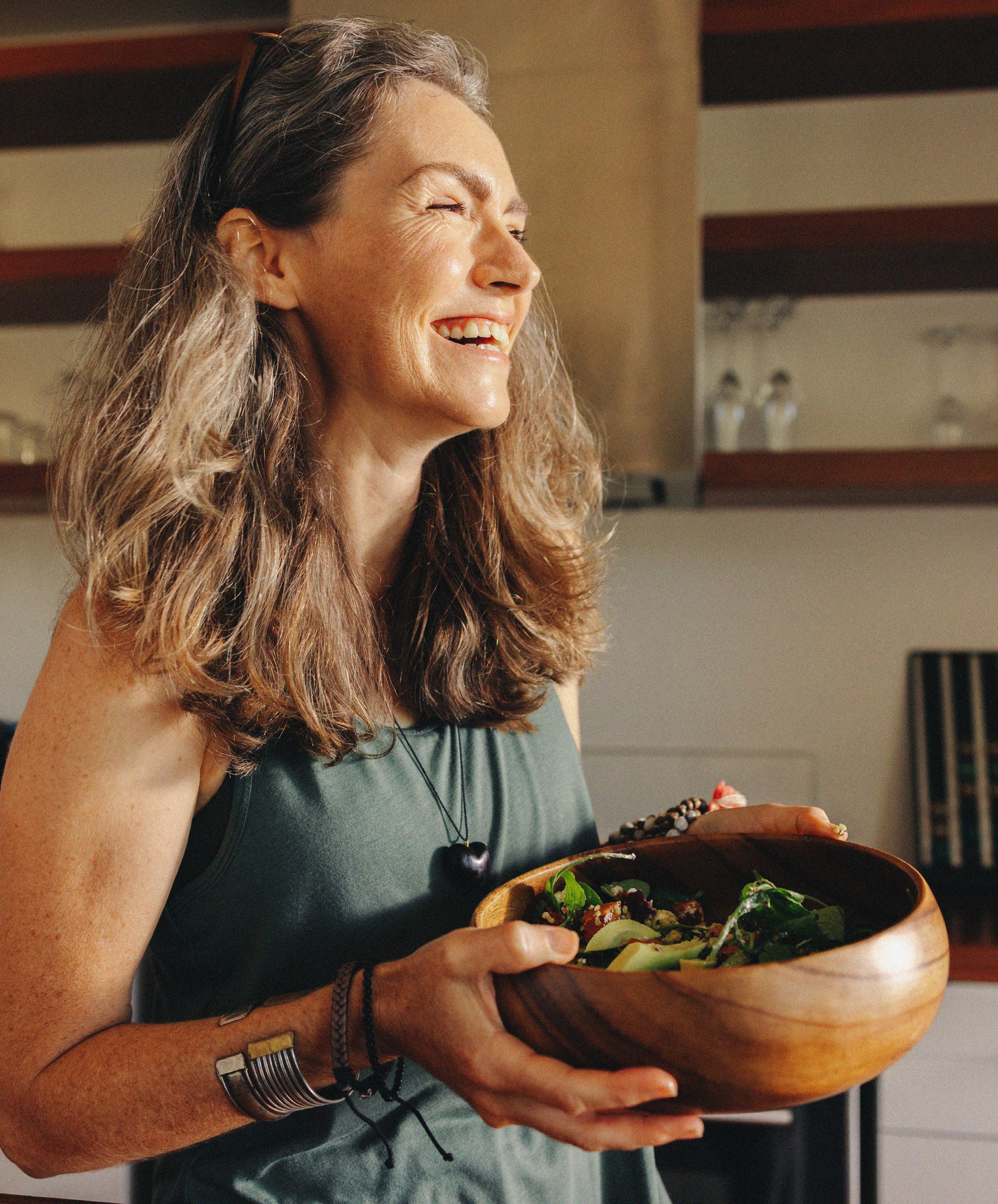
As the sun starts shining, you might find yourself craving a juicy, tasty, protein-packed salad. But eating your greens doesn’t need to be dull and repetitive, and I urge you to try this recipe which is perfect for the summer months. Simple, delicious and refreshing – this salad is a must-eat this season!
Serves 2–3
• 1 medium sweet potato
• 2 tsp olive oil
• 200g tenderstem broccoli
• 2 pre-cooked mackerel fillets
• 60g bag rocket, washed
• 250g pouch pre-cooked quinoa
• 80g pomegranate seeds
• 80g hummus
For the tahini dressing:
• 60g tahini
• 1 tbsp lemon juice
• 2 tsp extra virgin olive oil
• 1 tbsp maple syrup
• Pinch of salt
For the pickled red onions:
• 2 red onions
• 300ml white wine vinegar
• 45g caster sugar
• 1 tsp salt
To pickle the onions:
• Finely slice the onions.
• In a pan, add the white wine vinegar, sugar and salt. Bring to a simmer.
• Stir gently, until the sugar and salt have dissolved. Take off the heat and leave to cool.
• Once cooled, pour the liquid into a jar. Add the onions and cover.
• Leave aside to pickle for at least 2 hours.
For the salad:
• Preheat the oven to 180°C.
• Cube the sweet potato, and place it in a roasting tin. Season with salt and pepper, and drizzle with olive oil. Bake for 20–25 minutes until cooked. Leave to cool.
• Halve the tenderstem broccoli and steam for 5 minutes. Drain and leave to cool.
• With a fork, roughly tear apart the pre-cooked mackerel into bite-sized pieces.
• Make the salad dressing by whisking together the tahini, lemon juice, extra virgin olive oil, maple syrup, and salt. Add a splash of water to create a loose consistency.
• In a large bowl, add the rocket, pre-cooked quinoa, roasted sweet potato, cooked tenderstem broccoli, mackerel and pomegranate seeds. Mix together.
• To serve, spoon the salad onto your plate. Add the pickled red onion and hummus.
This salad isn’t only bursting with colour, but nutrients, too. In plantbased foods, colour represents the different vitamins, minerals, and antioxidants. Sweet potatoes are orange due to vitamin A, which supports healthy skin and vision, while bright green broccoli is plentiful in vitamin K (supporting blood clotting), folate (for healthy red blood cells), and potassium (helping maintain normal blood pressure). Red pomegranate seeds offer vitamin C, to help with wound healing, and healthy skin.
These tasty foods are also packed with antioxidants (which help prevent inflammation, heart disease, and certain cancers), and prebiotic fibres, which help your gut bacteria to thrive. Hummus is high in iron (great for keeping red blood cells healthy) and plant-based protein, which helps build muscle, and satiety.
Mackerel is a good source of complete protein (containing all nine essential amino acids, the building blocks of protein which can only be found in our diet), and heart-friendly omega-3 polyunsaturated fats. Just 140g of oily fish offers you your entire week’s worth of omega-3!
Finally, the polyunsaturated fats in tahini dressing help lower levels of ‘bad’ LDL cholesterol. Made of sesame seeds, tahini is a source of calcium to help keep bones strong.
Lucy Jones is a registered associate nutritionist supporting clients with their gut health, their relationship with food, and navigating menopause. Visit her profile at the Nutritionist Resource.


“A life without love is like a year without summer
Iwas first diagnosed with type 1 diabetes at 17 years old. After two lots of blood tests, I remember being woken up by my mother with the doctor on the phone, before the GP surgery was even open, asking me to come in, immediately. I was told I was type 1 diabetic, and I needed to go to the hospital for treatment,” Happiful’s creative lead, Charlotte Reynell, shares, casting her mind back to the start of her own diabetes story.
Charlotte is one of 4.3 million people living in the UK who have diabetes, a serious condition where your blood glucose level is too high, because your body can’t make a hormone called insulin, or the insulin does not work as it should.
“At the time, I felt scared. I had my suspicions that the results were going to come back to say I was diabetic, but no amount of research can prepare you for a diagnosis of a lifelong condition –particularly at that age,” Charlotte adds. “Life was changing so much anyway (applying for university, starting exams, etc.) that another
thing on top led me to breaking point. I sobbed a lot that first week.”
According to charity Diabetes UK, people with diabetes are twice as likely to have depression. For counsellor Peter Heath, who has personal experience with type 2 diabetes, this doesn’t come as a surprise.
“The Diabetes UK stat is almost expected, since I discovered PTSD is a common comorbidity in the onset of the condition,” Peter says, going on to also highlight how people with diabetes have twice the risk of suicide, compared with the general population.
“A diagnosis of diabetes can do more than just take the wind out of our sails,” he continues. “While it can explain a lot of our discomfort, the confirmation that something is seriously wrong can be a severe setback to all our plans and dreams. In many cases, the realisation that we’re no longer able to be at our best is like a massive shock, albeit dragged out in ultra-slow motion.
Initial disbelief and denial are replaced by confirmation and the realisation that we have to cope with the inevitable dawns on us.” It’s a sentiment that aligns with Charlotte’s experience, and she reflects on her diagnosis being accompanied by a sense of mourning.
“Being diagnosed later in life can bring up emotions of grief, and a sense of ‘missing’ the life you had pre-diagnosis, and not having this extra thing to think about,” Charlotte explains. “It can be draining having to make extra decisions daily, that you didn’t once before.”
Charlotte points to research by Stanford University, which found that people with diabetes, on average, make 180 more decisions each day about their health than someone without diabetes. Having to handle these kinds of decisions is something that Peter recalls struggling with.
“I was first diagnosed in New York when I was working there several years ago,” he shares. >>>
When thinking about a condition like diabetes, it’s natural to first consider the physical impact. But what about the effect it can have on our mental health and wellbeing?

Love is the most powerful tool of all. It’s the best support. Express it at every opportunity
“After managing my eating changes pretty well in Manhattan, I had to unexpectedly travel to Africa on a business trip. On arrival, I discovered none of the foods I had relied on in New York were available there. It was quite a shock, and I spent a fair amount of those early days rejecting hotel offerings – leaving me hungry, and that’s not too good either. I was forced to spend more time than I’d banked on traipsing around supermarkets looking for acceptable products.”
But it’s not just the day-to-day mental load, as Charlotte highlights anxiety around the prospect of complications from diabetes in the future, taking injections in public, and having low blood sugar at inconvenient times.
These kinds of feelings are common for those with diabetes, and Diabetes UK offers support and information around ‘diabetes distress’, which refers to what some people feel when they’re overwhelmed by the relentlessness of diabetes, that can lead to diabetes burnout. All of which can result in a sense of isolation.
Stepping in to help can be an automatic response when a loved one receives a diagnosis, but there’s a balance to be struck.
“When you see someone struggling, naturally you want to offer advice, check-in regularly on their blood sugar levels, etc. But I think that can actually cause strain in relationships,” Charlotte explains. “I think it’s best to offer encouragement and understand that diabetes is tiring, and takes a
lot of mental capacity each day, and if there is any way to support someone in other ways, to take some mental load off, that will always be much appreciated.”
Peter shares a similar sentiment. In 2015, Peter’s daughter was diagnosed with leukaemia. Later, she developed steroid-induced diabetes, and was treated with insulin. “In my own experience of supporting a person with a chronic condition, I was so emotionally involved that, initially, I just couldn’t think clearly.

“After the shock of hearing it, I cornered the specialist consultant and explained my concerns. She told me simply to let the patient lead. That was it. Empowerment was the key. All choices and management were to be the sole responsibility of the patient. In this instance, the patient was a child, my child, and the weight of responsibility in this handsoff approach seemed absurd. But I suddenly realised that the suggested approach was precisely what I was trained to do. My chosen path in my journey into psychology was person-centred. And the specialist was patientcentred. The counselling gods had put us together.”
Letting go when a loved one has a chronic condition can be hard, but the confidence to do so can be found in taking the time to learn about it – and to unlearn misconceptions – as well as keeping conversations open.
“Love is the most powerful tool of all. It’s the best support,” Peter says. “Express it at every opportunity.”
“12 years down the line, I’m content with my condition,” Charlotte shares. “I control what I can – and what I can’t, I let go of, and try not to be hard on myself. I think it’s so important to find a balance, otherwise managing diabetes can lead to serious burnout. It doesn’t mean I don’t have bad days, but when I do, I just do what I can and move on.”
“The good life isn’t out of reach,” Peter adds. “But it’s also not a static thing: the good life is fluid. It’s like a river. It flows and moves over solid obstacles, and is shaped by banks as it travels to the sea.
“There is a positive side to diabetes. And it is enabled by learning to live with that change. And that, in itself, is an achievement. Accepting the feelings and living with them and embracing them can aid the healing journey. Learning to live with the condition is growth. Acceptance is growth. There’s sadness and happiness, sorrow and joy. There can’t be one without the other.”
And, to any others embarking on the same journey, Charlotte has a final message: “You’ve got this.”
What OCD actually is…






Obsessive & intrusive thoughts
Mental discomfort or distress
Fear of contamination (mental or physical)



Compulsive behaviours
Correcting thoughts
Disruptions to daily life


Avoidance
Shame & isolation
Mental rituals
What people think OCD is…
A need to be organised
Desire for cleanliness
Anna Richardson knows the life-changing value of hypnotherapy, as well as the stigma-busting impact of discussing life’s highs and lows – and she’ll happily start the conversation by sharing her own experience

There’s something about Anna Richardson that makes it very easy to open up to her. Within minutes of meeting, we’re already chatting about the menopause and my mother’s reaction the first time she watched Naked Attraction (for context, she wondered if shaving ‘down there’ is in fashion?!).
In person, Anna is as unwaveringly warm and generous with her personal insights as she is on screen. She’s ready to talk about pretty much anything, and throughout her stellar career as a TV presenter, producer, and writer, she’s done just that. For Anna, sharing life’s experiences is a sure-fire way to remove the shame and stigma often associated with mental health and illness, poor body image, and sexual expression.
“I often reflect upon why talking and sharing is so important to me,” Anna muses. “It might have something to do with my upbringing. My father was a vicar and my mother was a teacher, and I was brought up in a very busy, very open vicarage. It was at the heart of the community and our door was open to everybody. I think that was what prompted my interest in people’s stories. >>>
“As for my interest in shame, as much as we embraced people coming through our door, my parents were in a very unhappy marriage,” Anna explains. “There was definitely a sense of shame around that. I was told as a child that I shouldn’t talk about my emotions, or what was going on at home. So I think that’s led me, as an adult, to be curious about other people’s stories, to remove the stigma of shame, and to work on transformational shows. I always want to encourage people to own their shame, to tell themselves a different story to show that change is absolutely possible.”

The possibility of a different way of being – and seeing the world – is a constant theme throughout Anna’s work and conversations. She’s a seeker; someone who is constantly curious about how we move through our lives, and she’s open to new possibilities and to challenging her own beliefs and behaviours. She’s unequivocally positive about the power of both therapy and hypnotherapy, and her need to seek professional support for her mental health. Hypnotherapy in particular, she shares, helped her to address a difficult relationship with food that she’d previously been unable to get to the root of.
Uncovering what was happening beneath the surface for Anna began with a session led by worldrenowned Rapid Transformational
 Listen to Anna’s new podcast ‘It Can’t Just Be Me’, wherever you find your podcasts. You can also hear the full interview with Anna on Happiful’s podcast, ‘I am. I have’
Listen to Anna’s new podcast ‘It Can’t Just Be Me’, wherever you find your podcasts. You can also hear the full interview with Anna on Happiful’s podcast, ‘I am. I have’
Therapy (RTT) founder, and now friend, Marisa Peer. As part of a show, Anna was tasked with trying different approaches to both diet and body acceptance techniques, and reported the results back to audiences.
Anna confesses she was initially cynical about the effectiveness of hypnotherapy, but her experience was transformational. “I’d always struggled with eating, because I eat my emotions,” she says. “But through this hypnosis session with Marisa, I made the connection that when I was very little, I used food as a coping mechanism when my mum was ill in hospital, and that mechanism had continued into adulthood.
“What Marisa was very cleverly able to do was say to me, ‘You’re not a child who is four, you’re an adult now. You don’t need to do that anymore. There’s a better way of being. You can be whoever you want to be, and look however you want to look.’ That message was so powerful, it was extraordinary.”
This interaction sparked a deep desire in Anna to understand more about hypnotherapy and, as
a result, she trained and qualified as a cognitive hypnotherapist. She remains a staunch advocate for the impact hypnotherapy can have for everybody, if they’re willing to give it a go. “I believe we’re all capable of change,” she asserts. “We just need to tap into the resources within ourselves, have our hands held, and shown how to do it.”
Hypnotherapy remains part of Anna’s personal toolkit for managing life’s challenges to this day. Most recently, she’s sought hypnotherapy to work through a big change in her life – the menopause. She’s found this transition difficult, confronting, and anxiety-provoking, but in the style she’s become known and loved for, she wants to share her experience in the hope that it will help others, too
“It’s a transition in our lives that hasn’t been spoken about enough, certainly historically, and just how difficult the change in hormones can be on our mental health, and how we feel about ourselves, physically,” Anna says. “Yet there’s another side to it, which is
knowing ourselves, being unafraid to confront and challenge, and have some fun.
“I balance those two sides with good psychotherapy, hypnotherapy, and mindfulness. It’s important to check in on yourself every day too and think, ‘How am I feeling?’ Sometimes I feel challenged, sometimes I feel my confidence has been hit, but I’m OK. I’m on my journey, and I’m coming through the other side of it.”
Therapy evidently plays a key role in Anna’s life. She’s keen to impress the importance of finding the methods that work for each of us personally, as well as making the time to access external support, wherever possible.
“In the same way that we check in with our GP if we’re feeling a bit off, or go to the dentist if our teeth are a bit dodgy, we should check in with ourselves mentally as much as we do physically,” Anna says. “I think that we should all be having therapy, whatever that therapy looks like for you. Whether it’s counselling, psychotherapy, hypnotherapy, a mindfulness course, working with a shaman, or having acupuncture!
“I just really believe that everybody should be checking in with another person, a qualified stranger, who can take the story you’re telling yourself, help you challenge it, and then change it into a healthier, better version.”
We’re all capable of change, we just need to tap into the resources within ourselves
When you’re living with depression, it can often feel like you’ve been swallowed up by a heavy black cloud, and all the light in the world has gone out. You may feel lonely and isolated, and, at times, may start to question your existence.
But, what if I told you that it was possible to find moments of joy, happiness, and connection again even when living with depression?
As a holistic life coach, I am passionate about sharing powerful tools that can allow you to understand yourself better, so that you can tap into moments of deeper joy and connection. Here are three of my favourites:
Emotional check-ins are a process of consciously reflecting on your default emotional states throughout the day. When left unchecked, your mind often operates on autopilot, playing out patterns
of thinking and feeling that can keep you feeling low and depressed. Bringing awareness to this can help you begin to understand why you feel the way you feel.
How to do an emotional check-in: Set an alarm on your phone to go off three times a day. When it does, grab a pen and paper, and ask yourself these questions:
1. How do I feel right now –physically, mentally, and emotionally – on a scale of 1–10?
2. Why might I be feeling this way?
3. Am I reliving the past?
4. Am I worrying about the future?
5. What need/want do I have that isn’t being met?
6. How can I meet this need/ want in a loving, healthy, and uplifting way?
Engaging in this exercise can help you to detangle the thought process that has led to you feeling the way you do, and this can be incredibly empowering.
Pattern interrupts are a powerful tool to call on following an emotional check-in, when you want to shift the way you are feeling. There are three different types of pattern interrupts that you can use:
• Physical pattern interrupts involve using the body to physically distract or shift the emotional experience that you’re having in your mind. Doing 10 star jumps, dancing to your favourite song, taking 10 deep breaths, or going for a mindful walk, are all ways to physically shift your energy.
• Mental/emotional pattern interrupts involve using the senses to create a shift, for example listening to some calming music, diffusing essential oils, or journaling about how you are feeling.
• Spiritual pattern interrupts involve calling on a higher power to shift out of how you are feeling. You might say a
Moments of peace and contentment can be few and far between when you’re living with depression, but seeking them out, no matter how small they are, is worth the endeavour
prayer, visualise angels guiding you in some way, or envision a soft, golden light streaming into your body.

These are just a small suggestive list, but I encourage you to make a note of any other pattern interrupts that feel natural for you.
As you carry out each one, take a moment to pause and ask yourself, ‘Do I feel any different?’ If you feel even a tiny bit lighter,
add that into your collection. If you feel nothing, discard that technique and move on. Know that it can often take more than one pattern interrupt to create the emotional shift that you desire. But, remember, you’re not necessarily aiming for pure enlightenment and happiness. Sometimes, just moving up the emotional scale to a place of neutrality can feel deeply satisfying.
This is another quick and powerful technique that you can call on to create an immediate positive shift in the way that you think and feel.
When you change the way you breathe, you send a signal to your brain that shifts the way you feel, and vice versa! This is the power of the mind-body connection. Espresso breathing, otherwise known as ‘sniff, sniff, sigh’, involves a two-part inhale through the nose. and a one-part exhale through the mouth. The inhales are short and sharp, first breathing into the belly and then up into the chest. The exhale is then a long sigh. Repeat this pattern for about 25–30 breaths. Pause and notice the shift in your energy, and then complete this twice more.
Living with depression is challenging. These powerful tools won’t make everything you’re going through go away, but, with them, you can begin to tune-in to why it is you may be feeling the way you are feeling. And with this newfound awareness, you can learn to understand yourself better, and then start consciously carving out new actions to create new feelings.
Sometimes, just moving up the emotional scale to a place of neutrality can feel deeply satisfying


The air is warm against my bare arms, and carries the sweet earthy smell of freshly cut grass. Around me, people chatter, laughing and joking, and someone is setting up a barbecue. I can hear a lawnmower in another garden, and the sound of kids playing. It’s undeniably a summer’s day – the kind that’s made for savouring.
What memories does ‘summer’ conjure for you? Reminiscing over the moments I’ve just described, I also think about how, as an adult, I don’t often embrace summer in the carefree way I did when growing up. For every alfresco >>>

lunch, there’s sitting in a sticky workplace, staring wistfully at the clock, and wishing you were elsewhere. It’s easy to let summer slip us by when our lives are swallowed with responsibilities. While there are certain responsibilities I can’t avoid, I want to do more to embrace the summer; a season I love. So, how do I learn to do that?
I asked coach Helen Snape why embracing our inner child could be a great way to make the most of this summer.
“Our inner child is the part of us that feels our true emotions, and so we want to nurture that part of us through healthy emotional connection,” Helen explains. “While this can be with other people, it’s also the case that we are a part of nature, and can find fulfilling and genuine connections when going into outside areas such as gardens, woods, by the sea, or to a local park.”
There are so many benefits to embracing your inner child, Helen tells me. “This is the part of you that will show you what your true feelings are, and what
you need. This is critical for selfworth, healthy boundaries, and assertive communication.
“Embracing your inner child will allow you to be more open in your important relationships, and create greater intimacy, meaning you will enjoy more fulfilling relationships.”
And, of course, our inner child is related to the idea of fun and play. “As human beings, we are cyclical creatures,” says Helen. “We are not meant to work all of the time! We need a mixture of work, rest, and play. Play can give you mental rest, it can help you work off excess tension, and it can re-energise you.”
“We can, of course, connect with our inner child at any time of year,” says Helen. “What makes the summer a particularly wonderful time to connect with your inner child is that the warmer weather provides ample opportunities to experience play and fun outdoors!”
Many of us find it easier to connect with nature at this time of year. “As a child, we had a sense of
wonder and awe about the world – nature in its complexity and beauty re-cultivates that sense of awe and admiration,” Helen explains.
Think, too, about the curiosity you had as a child. I remember being mesmerised by the butterflies that would land on the buddleia that grew in the garden, with the delicate red of their wings and the way they flitted between the flowers. Being curious about the world around us can help with our appreciation and understanding of nature, and to feel more connected to it, too.
Consider the summertime activities you enjoyed growing up. Did you swim in the sea? Eat ice cream at the park? Kick a football around the garden with your friends?
Consider what these memories mean to you. What feelings do they bring up? For me, happy summer memories bring feelings of being carefree, of enjoying the sensory experience of the seasons, and of connecting with people I care about.
As a child, we had a sense of wonder about the world
Helen recommends reconnecting with activities you loved as a child and can return to now. From going on a camping trip and telling stories over the fire, to a picnic in a local park, building sandcastles at the beach, and a day at an amusement park (extra points if you eat an obscene amount of candyfloss) – there are so many options to explore. And then, think about the little things you can do each day, whether that’s taking your tea outdoors or going for a walk in the sunshine. Growing up, I loved a barbecue on a summer’s evening; the smell of the charcoal while we’d sit around nattering over our burgers. I realise, as an adult, this is something I rarely do, even though I love meeting up with friends for a meal. I also need to make more time to get outdoors during the summer and notice the changes around me, the hedgerows frothing with flowers, the wood pigeon hooting in the evening.
So, whatever it is that reignites your soul and brings back warm memories of a carefree childhood, why not slip on your sandals, slather on the sunscreen, and embrace the summer again?

It’s well known that we can learn a lot from looking to the past, and the ancient philosophy of stoicism is a prime example, as the lessons we can gather from it remain so relevant in today’s world. Formed in ancient Greece and Rome in the 3rd century BC, the concept is built on overcoming negative emotions, gaining perspective and taking action.
The vast majority of stoicism material is passed down to us through three distinctly different individuals practising the philosophy: Seneca, an educated playwright; Epictetus, a former slave; and Marcus Aurelius, the Roman Emperor (who you might recognise from the movie Gladiator!).
Using stoicism practices and ways of thinking can help anyone and everyone become better at what they do, and to live a life in alignment with their values, ensuring their energy is not drained in the wrong areas of their lives. Here, I’m sharing a few techniques inspired by the concept of stoicism, which you can apply to your life and reap the rewards...
How often do we find ourselves caught up in worrying about things that we have no influence over? The most important practice in stoic philosophy is differentiating between what’s in our control and what isn’t, and directing our thoughts and energy accordingly. Focusing on what’s in our control can help us to take action, and cut through unnecessary rumination. As Epictetus said: “The chief task in life is simply this: to identify and separate matters so that I can say clearly to myself which are externals not under my control, and which have to do with the choices I actually control.”
In today’s society, there is always the feeling of needing more, and striving for what’s next, so we never truly feel satisfied. But negative visualisation can help us develop contentment and gratitude.

For this exercise, bring to mind all that you do have in your life, big and small – your home, food in your cupboards, and your meaningful relationships. Then
imagine all this being taken away… How would it really feel? Once you have done this, return to the current moment, and you should find a newfound appreciation for what you do have, rather than a fixation on what you don’t.
From his personal journal, known as Meditations, Marcus Aurelius uses this question to cut through the inessential: “Ask yourself at every moment, ‘Is this necessary?’” This can be likened to the 80/20 principle, where it is argued that 80% of results come from 20% of the activity.
How often do we spend our time with trivial pursuits, or spend money on things we really don’t need? By asking this question, it can cut to the core, and allow us to focus on what is important to us. This can
help with productivity at work, quality time with others, and also to live a more minimalist lifestyle.
Seneca once said: “People are frugal in guarding their personal property; but as soon as it comes to squandering time, they are most wasteful of the one thing in which it is right to be stingy.” And he had a valid point in urging us to guard our time the same way we would our possessions or money, for it’s the only thing we can’t get more of. How much time do we ‘give away’ scrolling, attending meetings we don’t need to be in, or taking part in activities we feel we should do? One technique to help you to guard your time is
learning to say no more often. This can be difficult, but, like anything, start small and practise. Say no to the things that don’t matter, so you can have the energy to say yes to the things that do.

The stoics focus on four main values, known as the cardinal virtues, for a simple, content, and purposeful life. These are courage, wisdom, justice, and temperance. By following these, we are not seeking fame and fortune, which can feel empty, but looking to improve daily, as well as being of service to others. Personally, I like to reword them slightly to courage, wisdom, self-discipline,
and kindness, as well as adding in equanimity, to make up my own five guiding values for life. You might want to try the same with values that speak to you.
Deconstruct things from material possessions, and see them for what they truly are. While at a feast, Marcus Aurelius noted to himself that the wine was rotten old grapes. A pretty cutting overview, but it’s designed to not add extra value and attachment to such things. Could you see a pair of expensive trainers just for their purpose of protecting your feet? A brand new car just as a mode of transport to get you from A to B safely? You could even ask yourself, ‘Is this for me or am I trying to impress others?’ It could be a useful way to view what’s around you, to determine its true worth to you.
Stoicism, as a philosophy, has so much timeless wisdom that remains incredibly relevant in our modern world. It deals with topics ranging from time management to controlling our emotions, practising gratitude, and living in a more minimal way, which we can all benefit from.
For anyone interested in learning more, I suggest grabbing a copy of Marcus Aurelius’s Meditations, Seneca’s Letters from a Stoic, and Epictetus’s Discourses. Ryan Holiday has also written books and shares fantastic content on this subject. I currently use his Daily Stoic Journal every morning and evening for my own practice.

“All the wonders you seek are within yourself
THOMAS BROWNE
Following a stage 3 bowel cancer diagnosis in 2018, doctor, speaker, and health educator Dr Anisha Patel has released an informative and insightful book, Everything you hoped you’d never need to know about bowel cancer, to support others going through this life-changing diagnosis.
With so many unforeseen and unimaginable challenges on the journey of discovering and treating cancer, here, we share an incredibly moving and supportive extract on how to face the monumental task of sharing the news of a cancer diagnosis with children
Writing | Dr Anisha PatelLooking back, this was without doubt one of the trickiest moments in my life, knowing that I was about to share information that they might not fully understand the significance
of, but which undoubtedly would cause pain and heartache for all. How you impart this information will depend on your child, their understanding and experience of illness or cancer in the past, as well as their age.
You know them best. There is no right or wrong time to tell them, although it’s important to be honest as you can. If you don’t have all the answers, that’s absolutely fine, but it is important to tell them this. Some people >>>
choose to tell their children when they have a plan of action following all the results, to help ease that fear of the unknown.
We decided to tell our children the day after I was diagnosed. K and S knew something was wrong the moment we arrived back from hospital, and although as a parent your first instinct is

to protect them, withholding this information when they are aware the atmosphere has changed can leave them feeling vulnerable. Phone calls were being made, my mum had suddenly turned up out of the blue, people were coming and going from the house, tears at the doorstep, flowers being
left. It didn’t leave much to the imagination. Trying to explain this to the children when the reality had not sunk in, the diagnosis unprocessed, the situation incomprehensible, was near impossible.
I can’t actually remember how my children, aged six and seven, responded that particular day.

Trying to explain this to the children when the reality had not sunk in, the diagnosis unprocessed, the situation incomprehensible, was near impossible
The next day we were due to visit my brother-in-law for his 40th birthday. Apologies, D, not exactly how I would have wanted to wish you happy birthday – in my sleep-deprived, distracted state, our trip was in a bid to maintain as much normality as possible. As the front door opened, my daughter blurted out, ‘Mummy has cancer’ and then skipped off! We looked at each other bemused, my family in shock, but I knew this was S just processing the information given and also gauging an adult’s reaction to the remark. What I realized over time was there were many more questions to follow, including, ‘Mummy, will you die?’ A question that noone wants to hear, but in this situation, we had to face up to. Other questions included, ‘Can I get cancer?’ and ‘Daddy, you remove bowel cancers, why can’t you remove Mummy’s?’ At which point high-tech diagrams were drawn of polyps and early bowel cancers, along with video footage
of endoscopies. This took their interest to another level, but I guess they are the children of medics, after all.

I’ve met parents who ask my advice, as a GP, about how to tell the children about cancer. Sometimes they don’t want to tell their children. Because they are scared. Because they want to protect them. Because they don’t know how to. Because they are worried about their reaction. What I discuss with parents is this. Being honest with them signals to the child that you trust them, that you are in this boat together. That you are a team. Together you will get to the finish line, whenever and whatever that may be. It will make them feel less anxious and give them the space to ask questions and verbalize how they feel. Doing this can reduce their fear and anxiety. I know from personal experience that it can also bring you closer as a unit, whereby you are all supporting each other. And although this surely tested their resilience, this experience has taught my children so much more and is now a part of their tapestry.
My expert psychotherapist, Danni, knows only too well the long-term implications for children if parents aren’t honest
about a cancer diagnosis. For example, she explains how they can develop trust issues. It is by no means an easy conversation to have, but in the long run, you will be protecting your child(ren) and preserving your relationship with them. Not being honest may lead to fear and anxiety, as they will be aware something is wrong. They might build up ideas in their head about situations which may be unfounded – in the face of lots of whispering and maybe tears, a child is perhaps far more likely to think that ‘mummy and daddy are getting divorced’ rather than the reality of ‘mummy has cancer’.
It is also important to remember that little people have very big ears, and there have been instances when people have been discussing their cancer diagnosis with friends, or others have been chatting among themselves, and a child has overheard. In addition, the Chinese whispers that occur in the playground may reach a child who is unaware of their parent’s diagnosis, which can be devastating for the child. It is best they hear this from you as the parent.
We’ve come together to offer this list of tips for you to think about when telling children your news. >>>
• Prepare what you are going to say at this stage. You may find that writing down what you would like to discuss helps align your thoughts. Ensure you have spoken to your medical team so you are armed with facts, and they may be able to signpost you to resources to help support the children. Avoid too much detail as it may be overwhelming, but do explain words such as ‘chemotherapy’ and ‘radiotherapy’.
• Plan to tell them in a place where they feel comfortable and safe.
• Use open-ended questions, for example, ‘What do you know about cancer?’, and share experiences of others they may be able to relate to.
• Try to use the word ‘cancer’ or ‘bad cells’ rather than ‘poorly’ or ‘ill’. They may associate cancer with anyone who is feeling ‘poorly’ or ‘ill’ in the future. Generally speaking, Danni advises that those of primary school age (five and above) may be able to understand the word cancer depending on their maturity but if not, or younger, Danni suggests using the words ‘bad cells’ and ‘good cells’.
• Prepare yourself for their reaction. Some children may look at you and then immediately ask ‘What’s for tea?’ as if they haven’t heard, others may cry or look confused. Whatever it is, be prepared that it might not be the reaction you
were expecting. However, give them the time and space to process.
• Check their understanding of what’s going on and allow them to direct the conversation with their reactions and thoughts.
• Keep terminology simple and keep to the point, not dwelling too much on the future and the ‘what ifs’.
• Tell all the children in the house together so no one is left feeling the burden or left out. Occasionally parents think it is best to tell the older children and hide it from the younger child, but this is quite a weight for one child to carry and it can unintentionally break trust with the other child.
• Tell them as a family, and if you are a single-parent family, consider support from another family member or friend. Sometimes the person affected by cancer doesn’t want to be there, and that’s ok, as long as they know what is being said.

• Use visual aids, books or websites (see Useful Resources section).
• Explain how things may be different moving forwards while you undergo treatment.
• You don’t have to tell them everything at once if you feel it will be overwhelming, but do check their understanding and what they have heard and absorbed. You may find you need to repeat information, especially if they are younger.
• Allow space and time for questions with an open door policy if they have any concerns.

• Talking to children at regular intervals keeps them from fearing the worst and avoids them feeling isolated from the family and situation.
• Let them know not all cancers are the same and each person, even if they do have a similar cancer, will have a different experience.
• Inform the school so they can keep an eye out for them and ensure support is available.
• And finally, remind them they are totally loved.
Extract from ‘Everything you hoped you’d never need to know about bowel cancer’ by Dr Anisha Patel (Sheldon Press, £16.99).
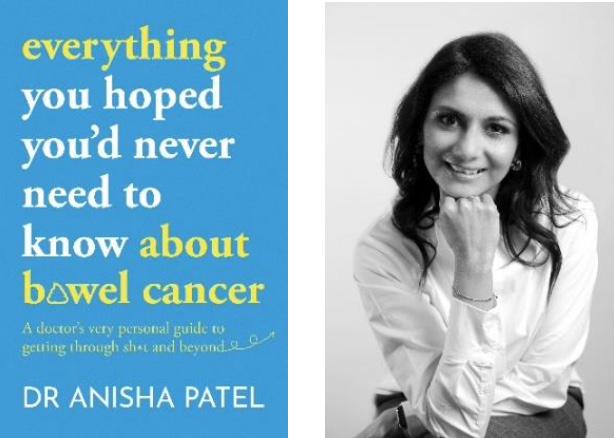

Compliment a stranger
Hide a friendly note
Make someone laugh
Leave tennis balls at the park for dogs
Create a homemade gift
Tell someone what they mean to you
Volunteer
Teach someone a skill
Give a small business a good review

“Isn’t it nice to think that tomorrow is a new day with no mistakes in it yet?
ANNE OF GREEN GABLES , LM MONTGOMERY
From a memoir about grief to a guidebook for those who meditate on the go, here are four reads that should make your reading list
IImagine the sensation of soft sand on the soles of your feet. How does it make you feel? Now try to recall the smell of your favourite ice cream. Does it transport you to a fond memory? Whether you’re engaging in sight, taste, smell, sound or touch, we have a lot to thank our senses for. Not only do they help us tune-in to the physical world around us, but
Walking
Meditations: To Find a Place of Peace, Wherever You Are by Danielle North (Out 8 June)


For those who struggle to meditate sitting still, Danielle North’s guide offers a unique approach to meditation. Her book is packed with advice on how to meditate on the go, with a series of walking meditations designed to refocus and relax the mind, wherever you are.
Life in Five Senses: How Exploring the Senses Got Me Out of My Head and Into the World by Gretchen Rubin (Out now) they also help us to live a happier, healthier life.
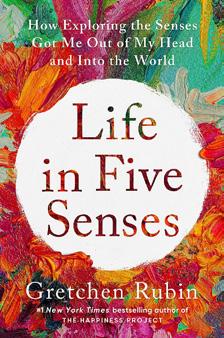
After experiencing an epiphany when visiting her eye doctor, Grethin Rubin realised that she had been overlooking the profound power of her senses.
Arthur and Teddy Are Coming Out by Ryan Love (Out now)

Get ready for a heartwarming novel about love and selfdiscovery! Follow the journey of 21-year-old Teddy and his grandfather, as they explore what it means to ‘come out’ and become their true, authentic selves, all while navigating the ups and downs of identity and acceptance.
Now, the bestselling author of The Happiness Project, is here to tell us why we should embrace our senses, and how to utilise them fully.
The Bleeding Tree: A Pathway Through Grief

Guided by Forests, Folk Tales and the Ritual
Year by Hollie Starling (Out now)
Holly Starling had her world turned upside down when she sadly lost her father to suicide. In this raw and moving memoir, Holly opens up about her own personal experience with grief, and how embracing folklore helped her through the healing process and to come out the other side.
When a friend or family member is struggling, what could be kinder than offering advice? Maybe you’ve been in a similar situation and have words of wisdom, or, as a less emotionally involved onlooker, you think you can see the solution more clearly.
However, have you ever been on the receiving end of unsolicited advice? Did you bristle with annoyance when a friend gave you guidance that just didn’t resonate?
When advice misses the mark it can leave us feeling unseen. For example, for someone struggling to get out of bed due to depression, the suggestion, “Have you tried going for a walk?’’ might feel insensitive, lacking insight into the severity of the situation. For someone whose partner has just left them, telling them “Have you tried journaling your feelings?’’ might leave them feeling shamed, as if they should be expressing their
Writing | Kate Orsonfeelings privately rather than in conversation. Well-meaning suggestions can sometimes land awkwardly, leaving someone feeling worse.
There are times when what we really need is simply to be listened to. In the midst of emotional upset, it can be hard to think clearly. The part of the brain responsible for rational, logical thinking doesn’t function well when we are clouded by emotions. Advice might be hard to absorb or consider when feeling upset.
Mel Riley is a psychotherapist who is passionate about the need to be with people where they are at, rather than trying to dole out quick-fix solutions. She says, “When people are struggling, before we can give any advice, they want to be heard. They need acceptance and understanding of just how devastating their situation is. It can be soothing for another person to name what’s going on, to notice how excruciatingly painful it is.’’
This is not something that we are taught to do. Most of us didn’t have models growing up of what it looks like to truly be present with another person’s emotions. It can trigger our own unheard feelings from times we weren’t listened to. There can be a tendency to go into ‘rescuer’ mode, and want to fix the other person, as it’s so painful to observe their hurt.
Mel says, “We give advice because we need to feel helpful. If it’s someone we care about, it can feel unbearable to see them in distress and be unable to help them. Giving advice makes us feel better, but often not the person we are giving the advice to.’’ It might not feel like much to simply sit there and be with their pain, but this is often what people need more than a list of solutions. It provides a sense of safety, so a person can calm down, their nervous system can settle, and they can begin to think more clearly. When this happens, they might ask for suggestions,
or be able to figure things out for themselves.
Mel stresses that there are times when it is important to receive advice from qualified experts. “There are too many armchair experts out there,” she explains. “Therapists are trained in neuroscience, but it isn’t just knowledge that’s important, but self-awareness. They need to

know when they are going into ‘rescuer mode’, and back off if a suggestion isn’t received well.”
Mel sees this process as offering a menu. For example, she says, “I could tell you I think yoga would be good for you, but you might actually hate yoga. I need to go bigger; I could suggest movement would be good for you. I would ask,
what kind of movement would be a good fit? I’m fishing all the time. I’m offering options, pick this or pick that. Once we’ve got movement, I can ask questions. What kind of movement? Do you want to move alone, with others online, or in an in-person group?’’
This approach of offering and listening acknowledges that we >>>
might not know what is right for another. It opens up the conversation for them to think for themselves with support. Communicating like this allows us to learn more about the other person, with gentle suggestions, rather than assuming we know better than them what they need.

Mel looks for signs in someone’s body language that suggestions hit the spot. “When the advice is right, people come alive. They look excited, they look interested, they are soothed.” Mel explains this is not exactly advice, but ‘hitting spots’. The question of whether to exercise in-person or alone might, for example, bring someone to the realisation that they are lonely. It is a journey of self-discovery, where the client feels empowered and heard.
If you’re noticing yourself giving a lot of advice, it can be helpful
to reflect on what’s going on for you. Is it painful to observe a loved one’s struggles? Does the situation trigger something from your past? The desperate need to ‘fix’ another person can be an indication that our own emotions need a little attention. Having space to vent with a therapist or journal can help. It’s not easy being a listening ear for others, and it can be frustrating when they are deep in pain and don’t feel ready to explore solutions. One activity that can bring awareness to our tendency to give advice, is to keep a journal for a week and notice the times you receive advice, or the times you feel tempted to give advice. Notice if some people give more advice than others. Notice if there are people you hold stuff back with if you don’t want to receive advice. Notice how it feels to
receive. Notice what you’re feeling when you’re tempted to give advice. This process can be an eyeopening way to not only help our friends more effectively, but also come to a deeper understanding of our own inner life. With a greater understanding of ourselves, and listening to others, our relationships can flourish.

“ There can be a tendency to go into ‘rescuer’ mode, and want to fix the other person, as it’s so painful to observe their hurt




only £5.99 per month
Exclusive journaling section Includes UK delivery Cancel or pause at any time
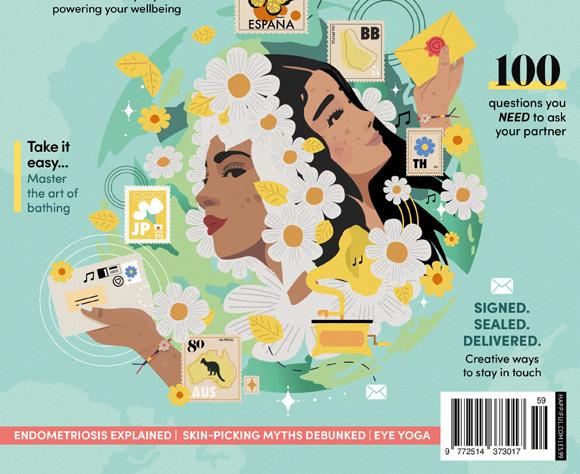



Delivering on our mission to create a happier, healthier, and more sustainable society.













